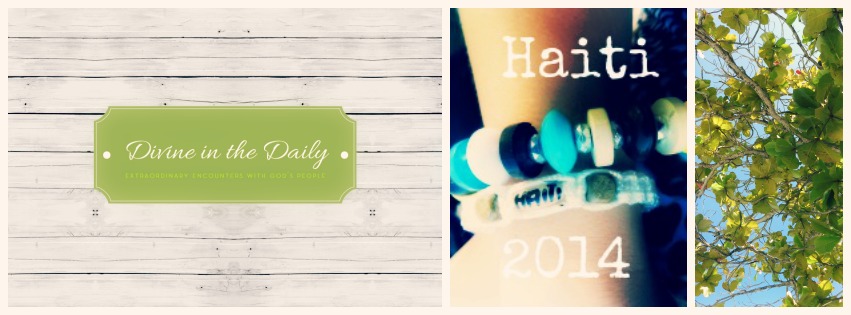
There are some stories I’m simply not willing to water down or skip over details for the sake of a reader-friendly 500-1,000 word blog post. This is one of those stories. This, in honor of our brothers and sisters in Haiti, especially Antonio.
I watched the sun rise over Haiti. It was Tuesday, October 16, 2012.
 Our family was cruising on one of Royal Caribbean’s largest ships, Freedom of the Seas, with stops at Haiti, Jamaica, Cayman Islands, and Mexico. Haiti was our first stop. Haiti, a port that especially piqued my interest when we booked the cruise.
Our family was cruising on one of Royal Caribbean’s largest ships, Freedom of the Seas, with stops at Haiti, Jamaica, Cayman Islands, and Mexico. Haiti was our first stop. Haiti, a port that especially piqued my interest when we booked the cruise.
I thought we’d spend the day visiting an orphanage where family friends are adopting two children, only to discover the orphanage was across the island, not to be traveled in one short day. I thought we’d sponsor a child and arrange for a special visit, only to discover that Royal Caribbean owns this private peninsula in Haiti known as Labadee, and doesn’t allow passengers to travel beyond the borders of that space for safety concerns.
I’ll be honest. I was a little devastated to realize I was going to be trapped in this little fenced in piece of Haiti when all I really wanted to do was go beyond the borders.
I devoured blogs about Haiti. I’d read nearly every post written by my favorite blogger, Ann Voskamp, including her trip to Haiti with Compassion International in July 2012. And the Help One Now bloggers had been in Haiti the same month we went on our cruise. A little girl referred to Kristen Howerton as “mommy” at an orphanage, a father tried giving his son to Duane Scott, and Jen Hatmaker’s description of a little girl sweeping the dirt floor nearly melted my heart. I knew more than enough to say confidently there was no way I was going to spend my one day in Haiti on a roller coaster or inflatable water toy.
We discussed and decided to forgo all shore excursions that day and instead sponsor a child in Haiti through Compassion International. We planned to spend all of our dollars at the market, directly in the hands of locals.
We got off the ship as early as we could so we’d be among the first on the peninsula. The four of us walked all the way down to the end where we found the market. People were already begging us to come and see the items they had for sale. One hat for me and one for my daughter, bargained to $30 for the two. They were way overpriced (the ship sold similar hats the day before for $10), but not worth further haggling considering what we knew about the need. We bought a handmade sword for our son, and a mini painting, handmade easel and magnet for us. The man next door begged, pleaded for us to visit, pointing out #4 on his tag. I told him we’d be back later.
It was our two oldest kids’ first visit to another country and first time at the ocean. They were behaving like brats when we got to the beach that morning. I told them I was so sick of hearing them complain, I was going to write down what they said. “I hate this zipper.” “This is too rocky.” “This is the dumbest place ever.” “Agh! I want to go to the market.” “All you guys do is sit.” “Wow mom.” With all seriousness, I reminded them that there are people on this island that might not have a thing to eat today, and they’re complaining about rocks and zippers.
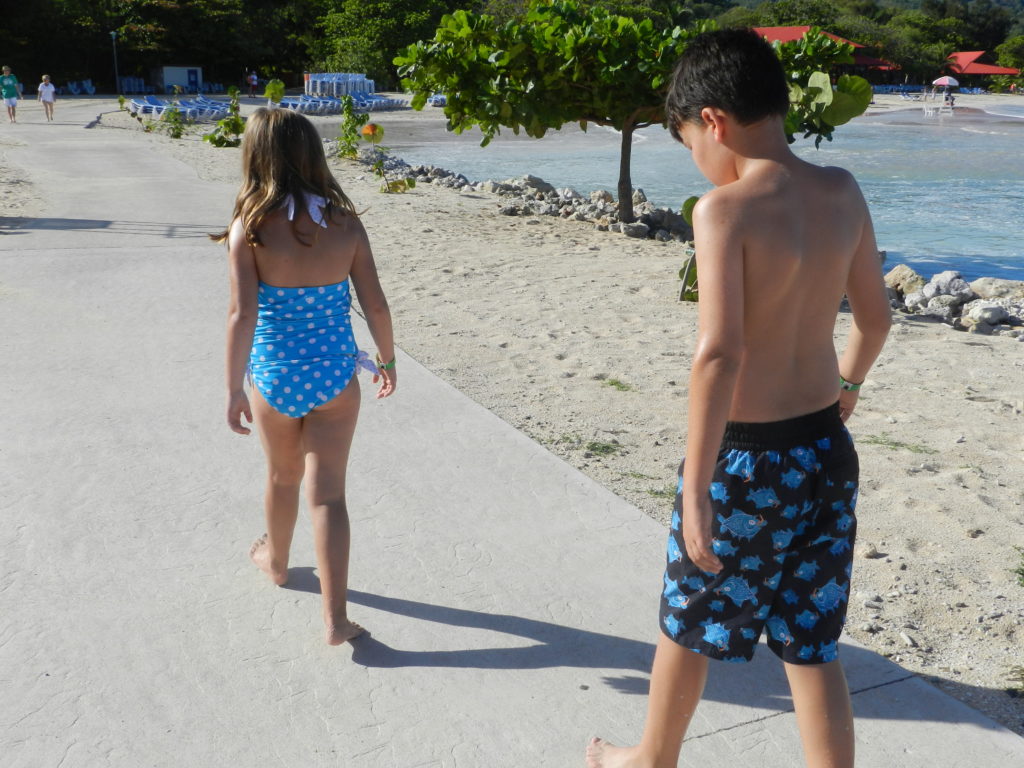 My husband and I decided this was not working, so we planned to bring the kids back to the ship so they could partake in the day’s childrens’ activities. First, though, we were going back to the market. I thought the market trip might be rewarding bad behavior, but quickly learned it was just what the kids needed.
My husband and I decided this was not working, so we planned to bring the kids back to the ship so they could partake in the day’s childrens’ activities. First, though, we were going back to the market. I thought the market trip might be rewarding bad behavior, but quickly learned it was just what the kids needed.
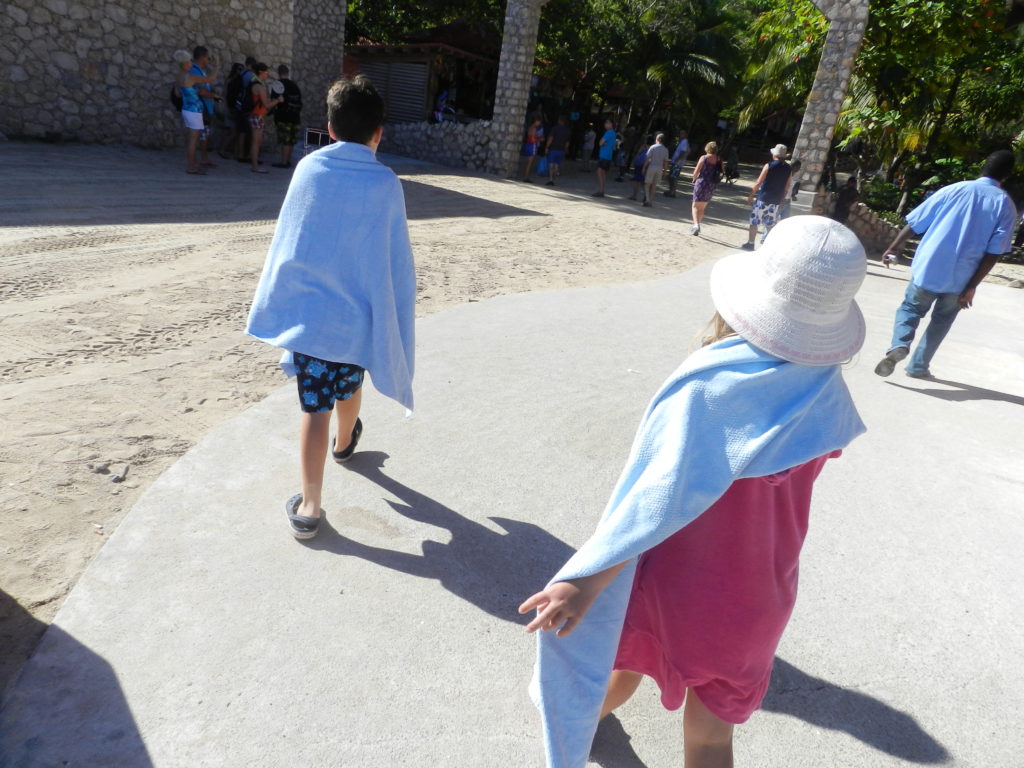 This time, we went up on the right, past the colorful display of canvas. When we came to the first row of vendors, Max came out to greet, introduced himself, invited us in, “No obligation,” he said. “Come see. We are family.” We barely got in, plaques were on the right at eye level carved with God Bless This Family and Jesus is My Boss. “You like these? Which one do you want?,” said Max. Sure, we’ll get one of these, I thought. Why not? Although I hadn’t a second to look at anything else. We bought the plaque and met the woman with Max, who I assumed was his mother and whose name I couldn’t understand. But she was warm and inviting, so after buying a small square pot, I gave her a hug.
This time, we went up on the right, past the colorful display of canvas. When we came to the first row of vendors, Max came out to greet, introduced himself, invited us in, “No obligation,” he said. “Come see. We are family.” We barely got in, plaques were on the right at eye level carved with God Bless This Family and Jesus is My Boss. “You like these? Which one do you want?,” said Max. Sure, we’ll get one of these, I thought. Why not? Although I hadn’t a second to look at anything else. We bought the plaque and met the woman with Max, who I assumed was his mother and whose name I couldn’t understand. But she was warm and inviting, so after buying a small square pot, I gave her a hug.
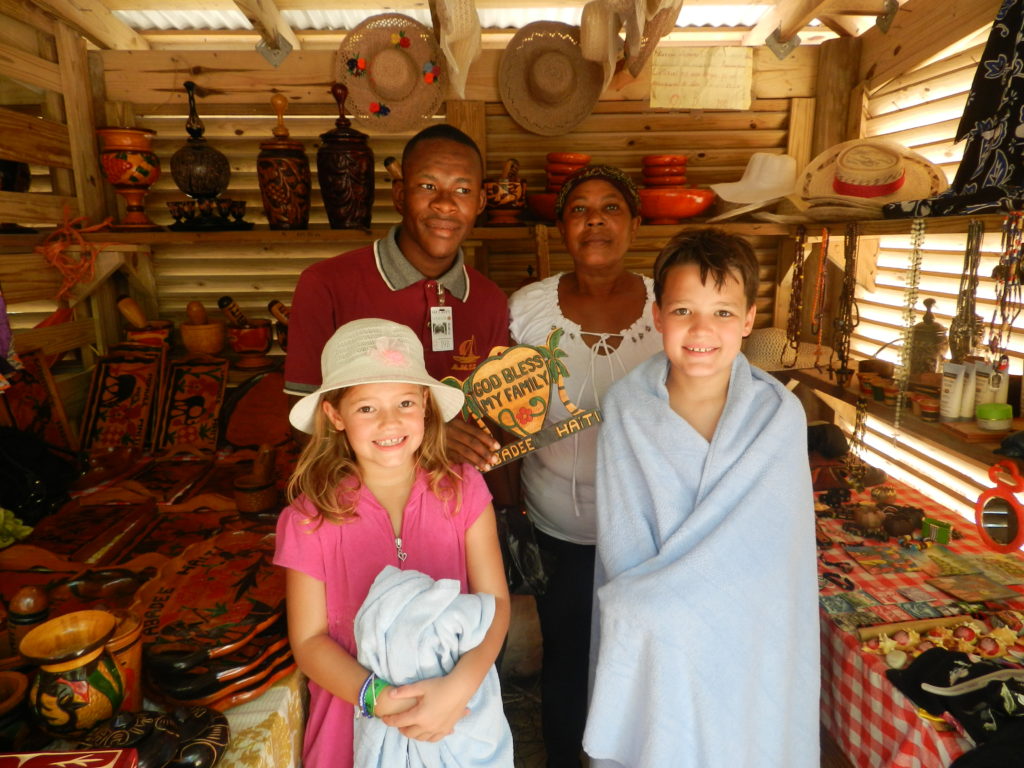 Next there was Margaret. She showed us dolls she sewed herself, oddly similar to ones we noted at Downtown Disney two days prior, only these black and red and white and so much more authentic, ALL painstakingly hand stitched I noticed days later. We bought a doll and I took Margaret’s name. Her smile was motherly and full of pride and joy over our love for this doll she’d crafted.
Next there was Margaret. She showed us dolls she sewed herself, oddly similar to ones we noted at Downtown Disney two days prior, only these black and red and white and so much more authentic, ALL painstakingly hand stitched I noticed days later. We bought a doll and I took Margaret’s name. Her smile was motherly and full of pride and joy over our love for this doll she’d crafted.
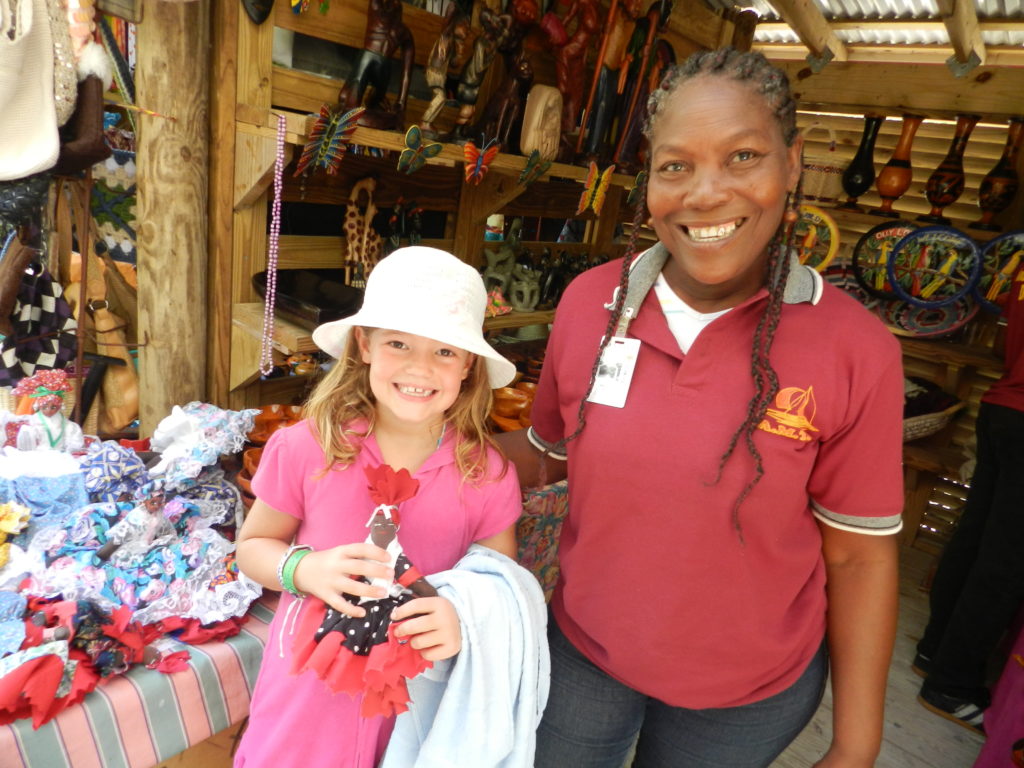 It took me a while to realize that a man had taken our bag with plaque, doll, and pot, and was guiding us to his booth down the row. He offered to carve our name on the plaque we’d purchased at Max’s booth. He carved PEDERSON on the back and showed us his wares, asking if we wanted anything else. The kids, likely completely overwhelmed, had not a want for anything. “Sword?” said Derby. Already got one when we first arrived. “Bracelet?” Max had given us one. “Nothing? You don’t want anything?” Derby said. My heart broke. All I could keep thinking was my kids want for nothing, and it’s possible this man might need for everything. To want for nothing, to need for everything, both unimaginable in that moment. I found myself embarrassed for my children, our culture of excess, of everything all around. The look on his face when the kids wanted nothing was seared on my heart forever. My kids wanting nothing might mean him not eating today, tomorrow. He wasn’t just sad, he was disappointed, a devastated kind of disappointment. I could see it in his eyes. A reason for payment came to my mind – I paid him for carving our name on the plaque, thanked him generously, and left. Many others were calling for us. Looking back, I realize this moment was in a complete frenzy, another state. I was barely processing what was happening. We should’ve stayed longer at Derby’s place. The look in his eyes haunts me to this day. And you can see in my daughter’s face, she felt his need too.
It took me a while to realize that a man had taken our bag with plaque, doll, and pot, and was guiding us to his booth down the row. He offered to carve our name on the plaque we’d purchased at Max’s booth. He carved PEDERSON on the back and showed us his wares, asking if we wanted anything else. The kids, likely completely overwhelmed, had not a want for anything. “Sword?” said Derby. Already got one when we first arrived. “Bracelet?” Max had given us one. “Nothing? You don’t want anything?” Derby said. My heart broke. All I could keep thinking was my kids want for nothing, and it’s possible this man might need for everything. To want for nothing, to need for everything, both unimaginable in that moment. I found myself embarrassed for my children, our culture of excess, of everything all around. The look on his face when the kids wanted nothing was seared on my heart forever. My kids wanting nothing might mean him not eating today, tomorrow. He wasn’t just sad, he was disappointed, a devastated kind of disappointment. I could see it in his eyes. A reason for payment came to my mind – I paid him for carving our name on the plaque, thanked him generously, and left. Many others were calling for us. Looking back, I realize this moment was in a complete frenzy, another state. I was barely processing what was happening. We should’ve stayed longer at Derby’s place. The look in his eyes haunts me to this day. And you can see in my daughter’s face, she felt his need too.
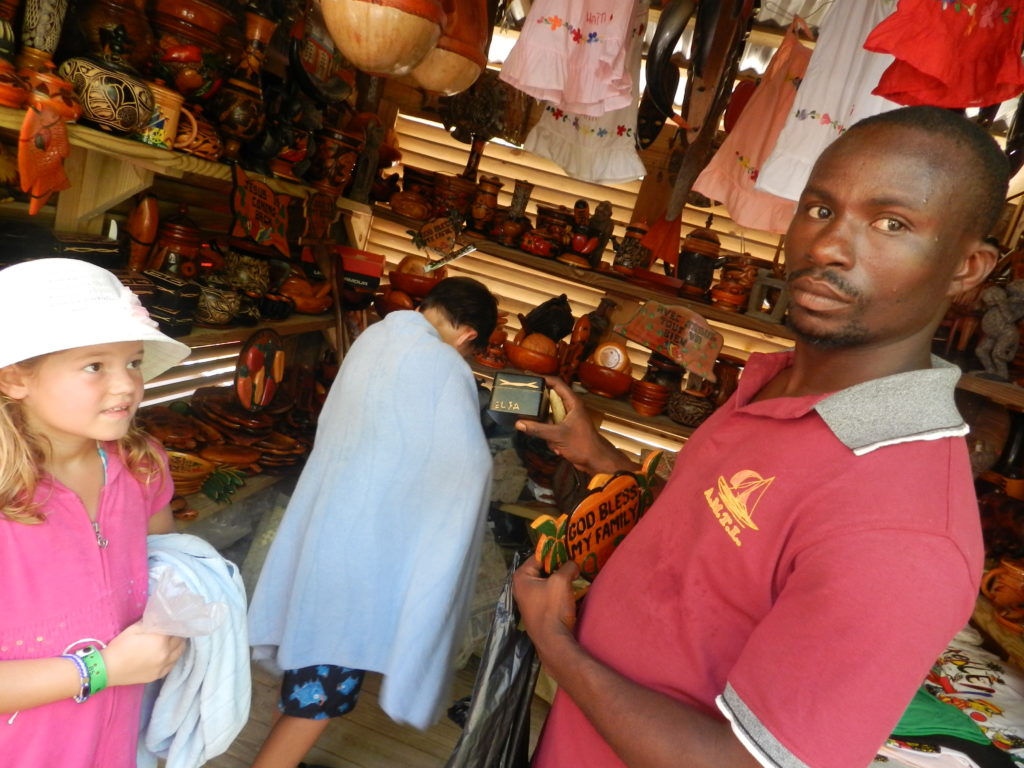 Jocelun led us to his place. He said in reference to my son, all wrapped up in his cruise ship towel, “He is my friend. I like him.” Jocelun touched my son gently on the shoulder. Before I knew it, Jocelun had a blue and white necklace on my son. Yes, we would buy. I asked for his name, I couldn’t understand so he wrote. He scratched JOCELUN on my tablet. He said again to my son “I like you. You are my friend.” Tears streamed, I was overwhelmed. Jocelun wanted me to take another look. I told him I’d promised a man down the row we’d come back to visit. Only $2 left, I wanted it to go to this man and keep my promise. Jocelun realized I was serious, so as he led me to the other man’s booth, he said “He’s a nice man. Go.”
Jocelun led us to his place. He said in reference to my son, all wrapped up in his cruise ship towel, “He is my friend. I like him.” Jocelun touched my son gently on the shoulder. Before I knew it, Jocelun had a blue and white necklace on my son. Yes, we would buy. I asked for his name, I couldn’t understand so he wrote. He scratched JOCELUN on my tablet. He said again to my son “I like you. You are my friend.” Tears streamed, I was overwhelmed. Jocelun wanted me to take another look. I told him I’d promised a man down the row we’d come back to visit. Only $2 left, I wanted it to go to this man and keep my promise. Jocelun realized I was serious, so as he led me to the other man’s booth, he said “He’s a nice man. Go.”
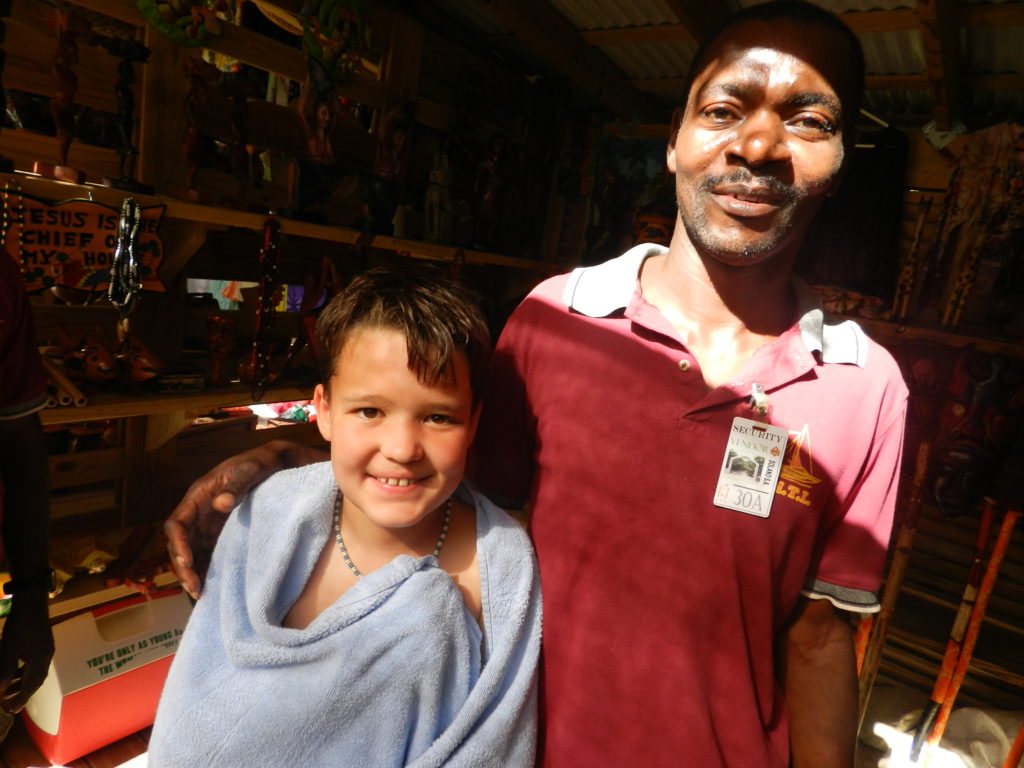 Wilfred was his name. Friendly man. Pots 2 for $5, he said. He accepted $2 for one when I told him that’s all we had left. I took his name and shook his hand. He smiled big and was clearly a warm and gentle heart.
Wilfred was his name. Friendly man. Pots 2 for $5, he said. He accepted $2 for one when I told him that’s all we had left. I took his name and shook his hand. He smiled big and was clearly a warm and gentle heart.
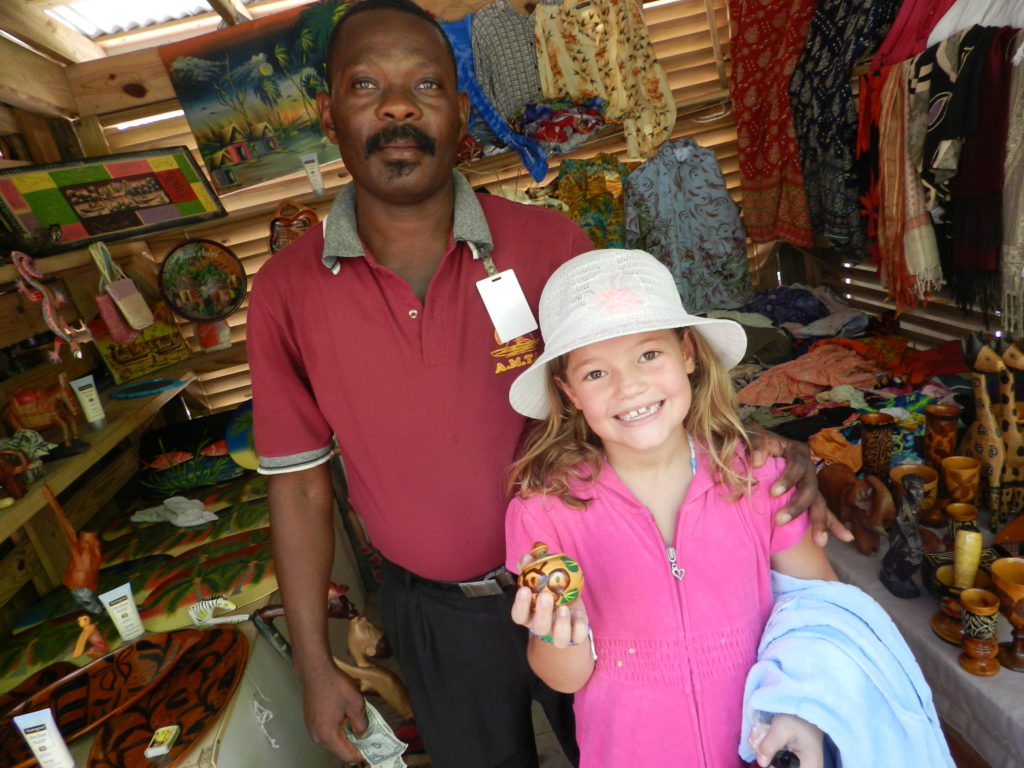 Then the floodgates opened. A crowd of Haitian vendors were behind us, all around us. One had somehow gotten my daughter’s small pot and carved her name on it with hearts. “I want you to remember me too. You come back and you see me.” Josias was the name he wrote on my tablet. I snapped a photo.
Then the floodgates opened. A crowd of Haitian vendors were behind us, all around us. One had somehow gotten my daughter’s small pot and carved her name on it with hearts. “I want you to remember me too. You come back and you see me.” Josias was the name he wrote on my tablet. I snapped a photo.
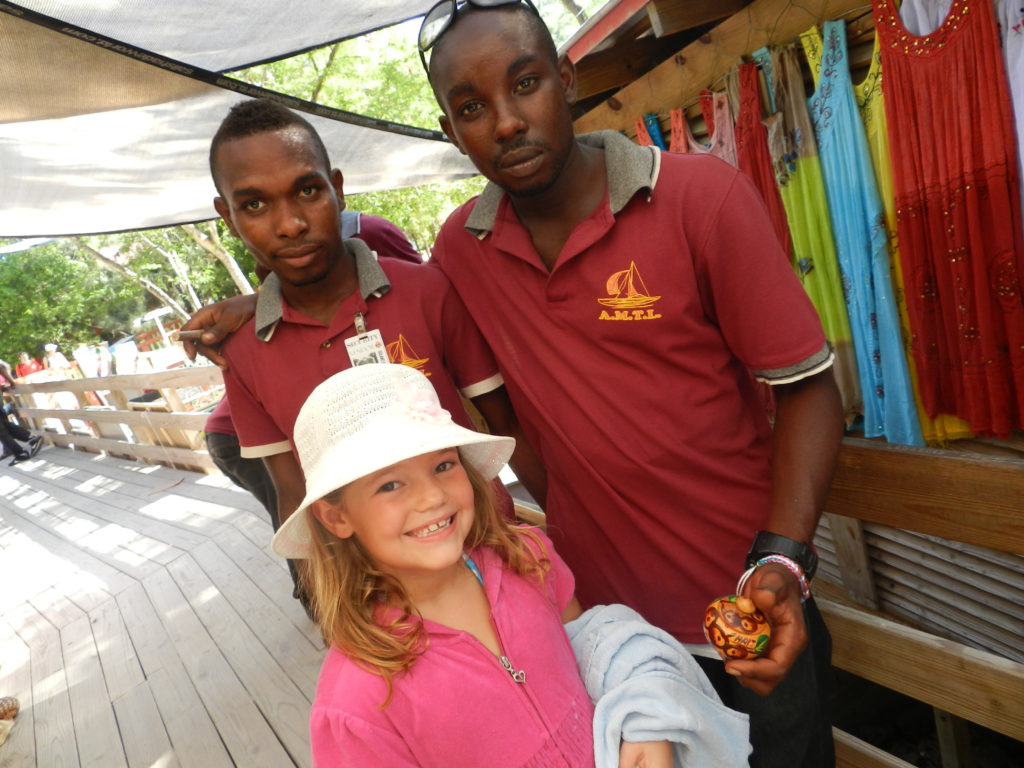 Another man approached, wanted to write his name on this tablet of mine. Leiys, I believe it was, barely intelligible. At this point, I realized I’d stumbled upon something. These people were not only willing to share their names, they were eager. It meant something to them, more than I could grasp. They saw me writing their names on the little tablet of paper I brought in my bag and they wanted a place on that space. To be recognized, to be known, to be called by name. Isn’t that what we all want?
Another man approached, wanted to write his name on this tablet of mine. Leiys, I believe it was, barely intelligible. At this point, I realized I’d stumbled upon something. These people were not only willing to share their names, they were eager. It meant something to them, more than I could grasp. They saw me writing their names on the little tablet of paper I brought in my bag and they wanted a place on that space. To be recognized, to be known, to be called by name. Isn’t that what we all want?
My husband, family, Royal Caribbean, and cruise-goers will be glad to know it was at this time I realized a security guard was close by, monitoring our interactions with the vendors, although I didn’t feel in danger, not even for a second. If I’d felt in danger, we certainly wouldn’t have been there or stayed.
We went back to the woman with Max to find out her name. Between the two of them, they struggled to know each letter, silent glances to each other before each letter to verify that was truly the right way to spell her name, Almagor.
Returning to our spot on the beach, my husband took the kids so I could process it all. I stood for a while. This was no place to sit on the beach. Finally I sat. I looked down. I’d forgotten the bag I packed at home to give to a local at this market. I looked through the photos I’d taken of the vendors we just met at the market. Was the bag for one of these? Derby. The sadness in his eyes struck me. I processed the disappointment I sensed when the kids wanted for nothing at his booth. The bag was for him and his family.
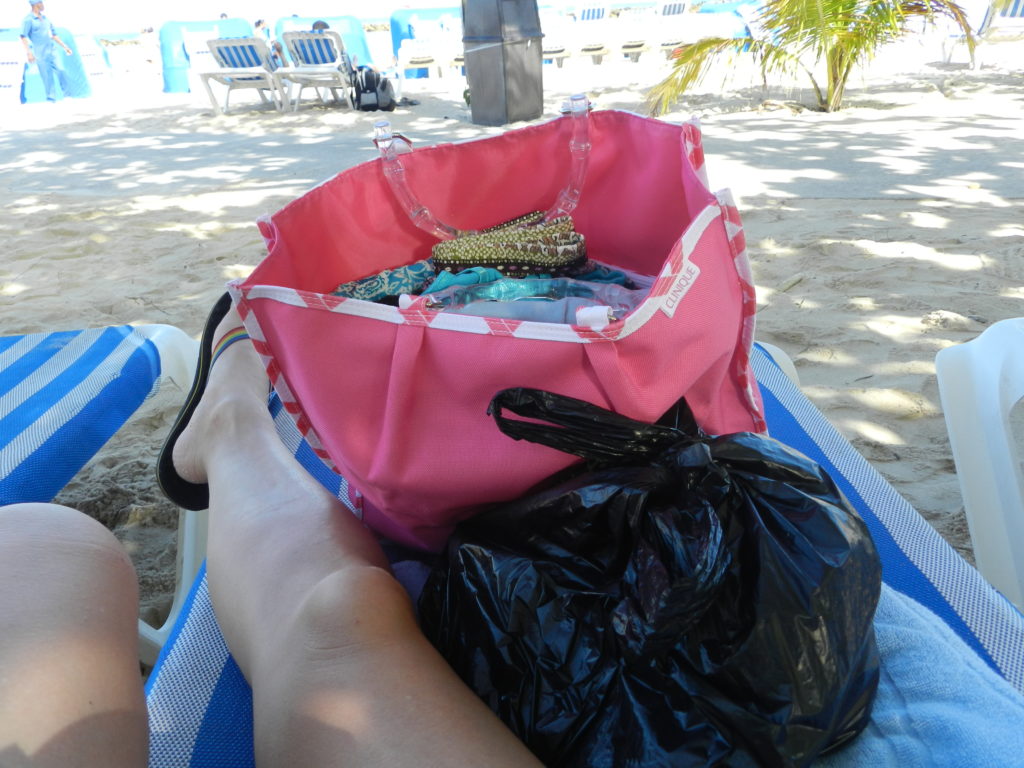 Venturing back to the market by myself, I entered by Max. Max and Margaret and Almagor approached, others literally swarmed around. I explained I’d forgotten this bag of clothes and was bringing it for Derby, four booths down. A man spoke definitively “I have a baby ma’am.” I had brought two receiving blankets and gave them to him. Margaret and Almagor were hovering, nearly reaching in my bag. One of them said “I need something.” My hands could do nothing but take out each item and give to those who were asking. A dress for one woman, a dress for another, a shirt and skirt for Margaret, two bananas for a man. Margaret gladly took the bag, “I need this.” If I’d only known, I would’ve brought another bag full, or two or three.
Venturing back to the market by myself, I entered by Max. Max and Margaret and Almagor approached, others literally swarmed around. I explained I’d forgotten this bag of clothes and was bringing it for Derby, four booths down. A man spoke definitively “I have a baby ma’am.” I had brought two receiving blankets and gave them to him. Margaret and Almagor were hovering, nearly reaching in my bag. One of them said “I need something.” My hands could do nothing but take out each item and give to those who were asking. A dress for one woman, a dress for another, a shirt and skirt for Margaret, two bananas for a man. Margaret gladly took the bag, “I need this.” If I’d only known, I would’ve brought another bag full, or two or three.
Then, more I didn’t anticipate. The others, swarming around to see if they could get just a piece from this bag that had been emptied and now was gone, started to tell me their names, their vendor numbers, what they needed. Too many to count, too many to even be able to notice, to process. I started writing.
Alfred, #22, clothes for a 7-year-old and 10-year-old.
Antonio, clothes for his 2-year-old son. I didn’t get his number. I wish with all my heart I would’ve.
Jackson, #19A, he pulled me aside a bit to ensure I heard his need. Men’s pants, jeans, shirts, “anything.”
Reno, I’d seen him earlier. He approached now again. “Remember me, Reno.” I wrote his name.
And Max. “Remember me. I’m the one that showed you here.”
I was empty handed. I said I’d do my best, but can’t promise. I remembered stories of Americans who promised they’d come back but never did. I didn’t want to be that person.
Before I left, those to whom I’d given lavished me with smiles and gifts and gratitude. Bracelets, a hand painted shell, a small pot, and many “God bless you.”
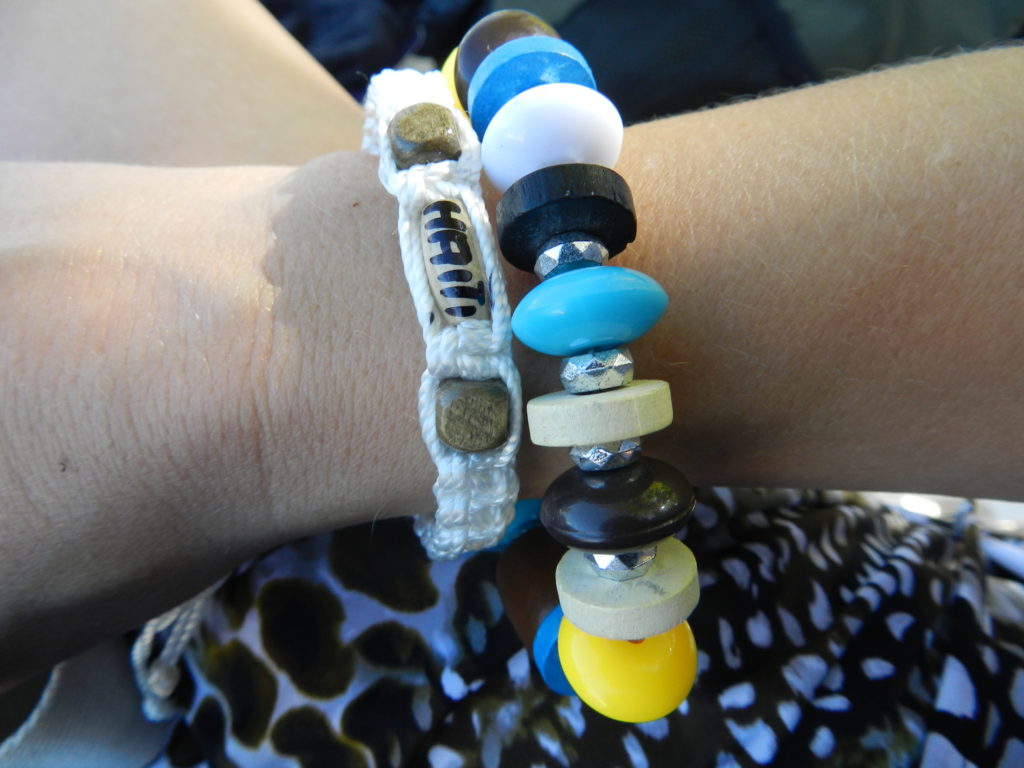 I returned to the beach. My husband and the kids were still gone. I looked up, looked around. There was still no time to sit. I walked the beach a bit. A mom was rushing on the shore, so mad at her kids. A man’s fat belly protruded as he sunbathed. A buffet was being set. Did they know the need just beyond the arches in the market, beyond the fence that bound us in and them out?
I returned to the beach. My husband and the kids were still gone. I looked up, looked around. There was still no time to sit. I walked the beach a bit. A mom was rushing on the shore, so mad at her kids. A man’s fat belly protruded as he sunbathed. A buffet was being set. Did they know the need just beyond the arches in the market, beyond the fence that bound us in and them out?
A Haitian man raked a patch of sand back to perfection.
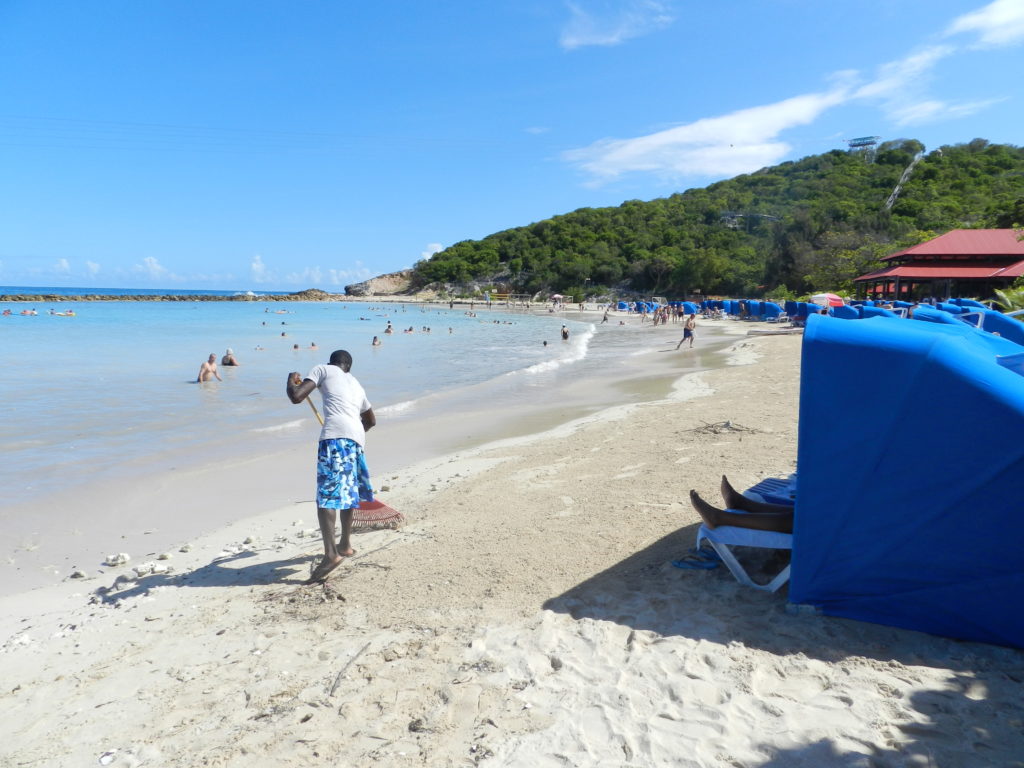 As I thought and moved about, I was especially concerned about this man, Antonio, who needed clothes for his 2-year-old son. I knew I had none. I’d have to leave him empty handed, hopes dashed, or search and make a plea to some random mom. We were at the beach, a distance from the ship. A mom would have to give the clothes off of her son’s back or go all the way back to the ship to suitcases. This was my journey that day, not some other mom’s journey. Or was it? I was confused, torn. Search for a mom with a 2-year-old boy (there weren’t that many) and ask them to surrender part of their day vacationing with family to meet the needs of a man I had met at the market? I couldn’t bring myself to ask even one, but kept thinking of the moms at home and how they’d all give the shirts off their sons’ backs for this toddler in need. I kept thinking of the boxes of clothes I had sitting in our basement. I didn’t even ask one mom. Two worlds collided. The reality I saw on one side, the reality I saw on the other. Could the two connect today? Was I telling myself truth that people wouldn’t want to know or didn’t care or just wanted to enjoy the beach? I think, and believe now, that my beliefs and behaviors in regards to those 2-year-old clothes were flawed that day.
As I thought and moved about, I was especially concerned about this man, Antonio, who needed clothes for his 2-year-old son. I knew I had none. I’d have to leave him empty handed, hopes dashed, or search and make a plea to some random mom. We were at the beach, a distance from the ship. A mom would have to give the clothes off of her son’s back or go all the way back to the ship to suitcases. This was my journey that day, not some other mom’s journey. Or was it? I was confused, torn. Search for a mom with a 2-year-old boy (there weren’t that many) and ask them to surrender part of their day vacationing with family to meet the needs of a man I had met at the market? I couldn’t bring myself to ask even one, but kept thinking of the moms at home and how they’d all give the shirts off their sons’ backs for this toddler in need. I kept thinking of the boxes of clothes I had sitting in our basement. I didn’t even ask one mom. Two worlds collided. The reality I saw on one side, the reality I saw on the other. Could the two connect today? Was I telling myself truth that people wouldn’t want to know or didn’t care or just wanted to enjoy the beach? I think, and believe now, that my beliefs and behaviors in regards to those 2-year-old clothes were flawed that day.
Not asking a mom remains one of my biggest regrets 16 months later. Why was I afraid to open eyes and hearts on that beach? Why not just one? Has a major distrust of humankind grown in my heart? Why do I believe strangers want to sit on the beach in oblivion more than they want to meet someone’s most basic of needs? What does it say about my character that I assume such things about others and I didn’t even ask one mom? Didn’t Jesus say that whatever you do for the least of these, you do for me? Was I only partially fulfilling this command rather than wholly by my unwillingness to ask on behalf of someone in need? 16 months later I have complete clarity – I should’ve rid myself of all pride and asked.
My husband and children returned. I explained what I’d done, listed the needs, and explained my uncertainty about the 2-year-old clothing. My husband supported the kids and I going back to the ship where we had more. It was somewhat close, but not a quick trip when considering tram, lines, security, and a long, hot pier.
 I gathered a pile of clothes for Alfred, a men’s outfit for Jackson, and a pile of fruit for Antonio, the very least we could do in lieu of clothes for his son. (I have notable regrets about not getting more from the ship. We should’ve come back all hands loaded, bags and bags overflowing. Again, some of this was mere lack of time to process everything that was happening.) Security noticed all the fruit at the bottom of the bag and made us drop it in a plastic bin before we deboarded. Almost in tears, knowing I would now return empty handed to Antonio, no clothes, no fruit, nothing, I obeyed. A woman standing by said “you never know if you’re doing the right thing, do you?” Little did she know. Even my daughter knew this was bad.
I gathered a pile of clothes for Alfred, a men’s outfit for Jackson, and a pile of fruit for Antonio, the very least we could do in lieu of clothes for his son. (I have notable regrets about not getting more from the ship. We should’ve come back all hands loaded, bags and bags overflowing. Again, some of this was mere lack of time to process everything that was happening.) Security noticed all the fruit at the bottom of the bag and made us drop it in a plastic bin before we deboarded. Almost in tears, knowing I would now return empty handed to Antonio, no clothes, no fruit, nothing, I obeyed. A woman standing by said “you never know if you’re doing the right thing, do you?” Little did she know. Even my daughter knew this was bad.
We headed straight for the market. The buffet had been served while we were gone, and my husband was sitting at the beach. Once again, I was feeling a tear between these two worlds. I wanted, needed to help these people, knowing there was much to be done, but was also cognizant of the fact I was on vacation. Our precious hours together as a family were ticking away. There were only a couple hours before we had to be back on the ship.
We approached at the market. They swarmed immediately. I don’t even know how many, just swarms. So much, so fast, so overwhelming, so difficult to process it all. Alfred, Antonio, Jackson, Max, Reno and all the others were there. Alfred quietly pulled me aside to his booth. I gave him the bag of kids’ clothes, he smiled, seemed satisfied.
Then Reno was there. I’d seen him twice now. He’d told me his name and said “remember me,” but I became keenly aware at that moment that “remember me” meant something much different to Reno than me. I remembered Reno, I noticed him and would remember him beyond this place, but he wanted me to remember him because he needed to be seen, he needed something and needed that to be remembered, wholly acknowledged, tended to, acted on. I hadn’t brought anything for Reno. All I could do was give him the shirt I brought for Jackson. After all, something would be better than nothing. I gave it to him, apologizing that’s all I had. He took it, thanking profusely with “God bless you.”
Then Antonio – oh Antonio. “You remember me, I need clothes for my son.” I explained we had no clothes small enough and we tried to bring a lot of fruit for him, but security wouldn’t let us bring it off the ship. “I’m so sorry,” I said.
Jackson pulled me aside just as I was still feeling horrible about not meeting Antonio’s needs. He wanted to know what I had for him. I’d given his shirt to Reno, so all I had was a pair of shorts. They looked big for Jackson. I asked if he had a belt, he did. “It will work,” he said.
And then there was Max. “You have anything for me? I told you to remember me too.” Yes, of course I would always remember him, but I didn’t know he, too, intended me to remember him with something, anything tangible that he needed. “I have a son,” he said. He glanced at my backpack, I took it off and looked in. My husband’s shorts and a belt he was wearing that day, my son’s shorts, and a refillable, leaking bottle of Pepsi were in the bag. When we were on the ship, I’d asked my son if I could give his shorts to the children in need. “No,” he said, “they’re my favorite.” “And the shirt,” I asked?” He was wearing both today, both his favorites. Two worlds collided, again. To honor my son and keep our trust, or take the the clothes off his back and teach him our call to give to those in need? Could my son really process that he was giving up his favorite shirt and shorts, the ones he was wearing today, for a child he couldn’t see? Doubtful, but I was still unsure. Max clearly wanted the shorts and I even began lifting them out of the bag for him, but a man overheard and said to Max “don’t push too far, it’s not good,” clarifying for Max those were the shorts my son was wearing today. This was humbling. It felt so wrong but a little right all at the same time. Right we were honoring my son and not taking the shorts from him, wrong another child’s need was going unmet. I honored the elder figure who urged Max not to push and closed my bag reluctantly. It all seemed so selfish. I could have, should have just handed over the whole bag. We would’ve done without for a couple hours.
People were still swarming all around. We were on our way out of that row, our hands empty except for the backpack. Antonio made his way forward once again. “You don’t have anything for me? I have a 2-year-old. I need clothes for my 2-year-old.” I couldn’t help but think later – Nobody in this world should have to beg a stranger for clothes for their child. What a horrible reality. I had to tell him again we don’t have little ones (pointing to my bigger children), and how we had fruit for him but it was taken away. He clearly needed those clothes so bad. I told Antonio we had to leave soon, “I’m SO sorry.” NO words would suffice. “Good bye,” I said apologetically. “Good bye.” “I’m so sorry.” They wanted to know if I’d be back. I said back to Haiti, probably not Labadee. “God Bless,” “Thank you,” is what I remember as I parted.
We returned to the beach. Cruise-goers were eating the buffet. My husband had been waiting, “perfect timing” he said. We talked about the people, what we gave, Antonio’s need for his son. My husband reminded the children that we can’t possibly help everyone, but we can help some, and that is what we’d done today. We ate. I almost became sick looking at the food, contemplated not even taking any, thinking of all the people so near in so much need. I took a burger, some fruit, an extra hot dog and two extra bananas. I passed the hot dog to a Haitian man in a band playing by the buffet, and later, gave the bananas to a man lingering behind a bar near the pier, waiting in quiet desperation on mere survival.
I took a moment to quiet myself after lunch and enjoyed the remaining moments for what they were. The beach was already clearing.
I kept thinking of Antonio still in need and how I dashed his hopes, Max, Derby too. I wanted to go back, but I was needed here now, and anything but clothes for their children would be patronizing.
My children made a sand castle. A circle of castles, one in the center. I didn’t notice its beauty and symbolism until it was complete. Two clearly imperfect, my son pointed out to my daughter “those are horrible.” My daughter tore them down plus two more. Frustrated she could not fix them and make them perfect, I said quietly “Try. It won’t be perfect. Just try.” She remade all four and the creation was better than it was before. Better, not perfect.
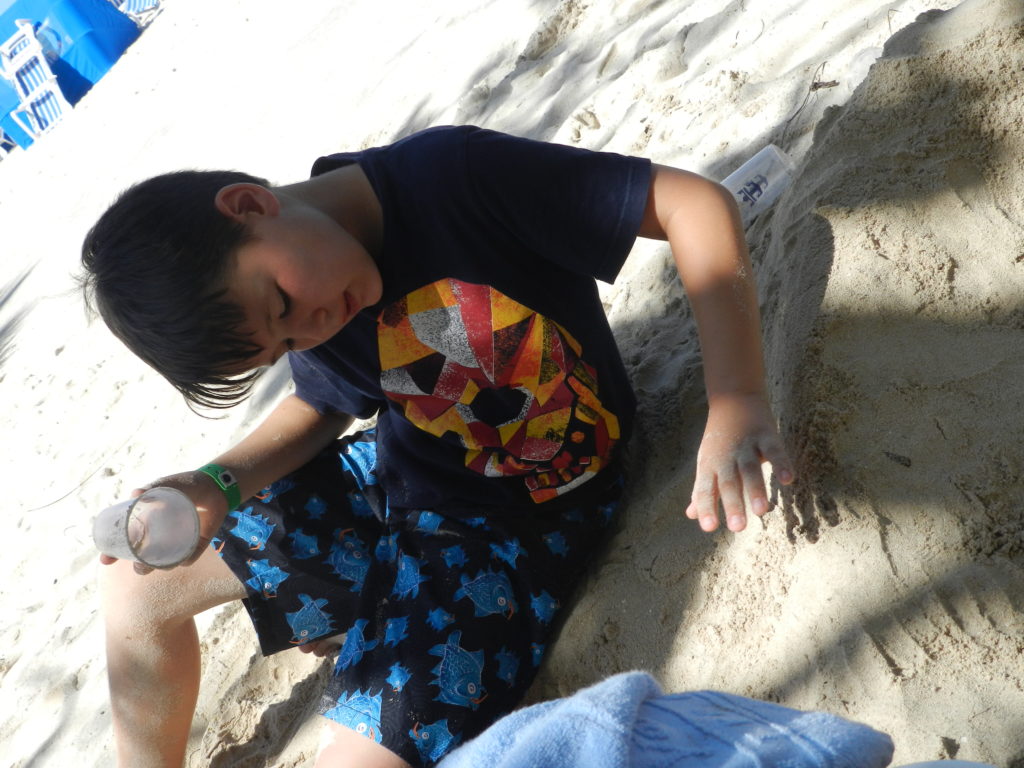
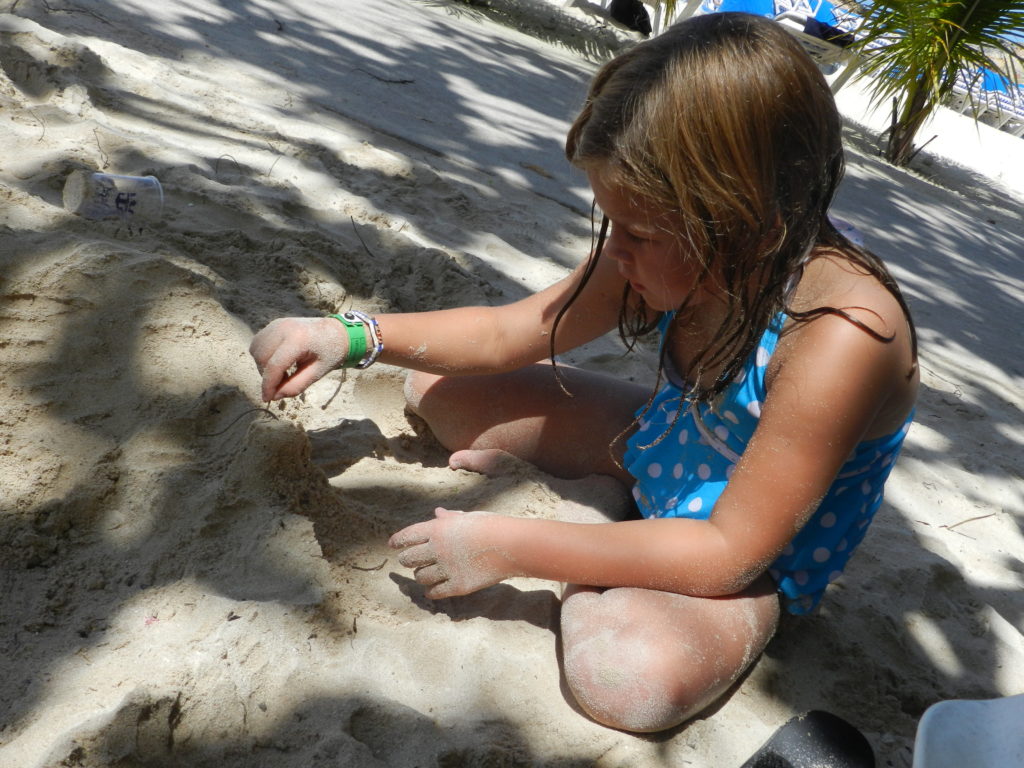
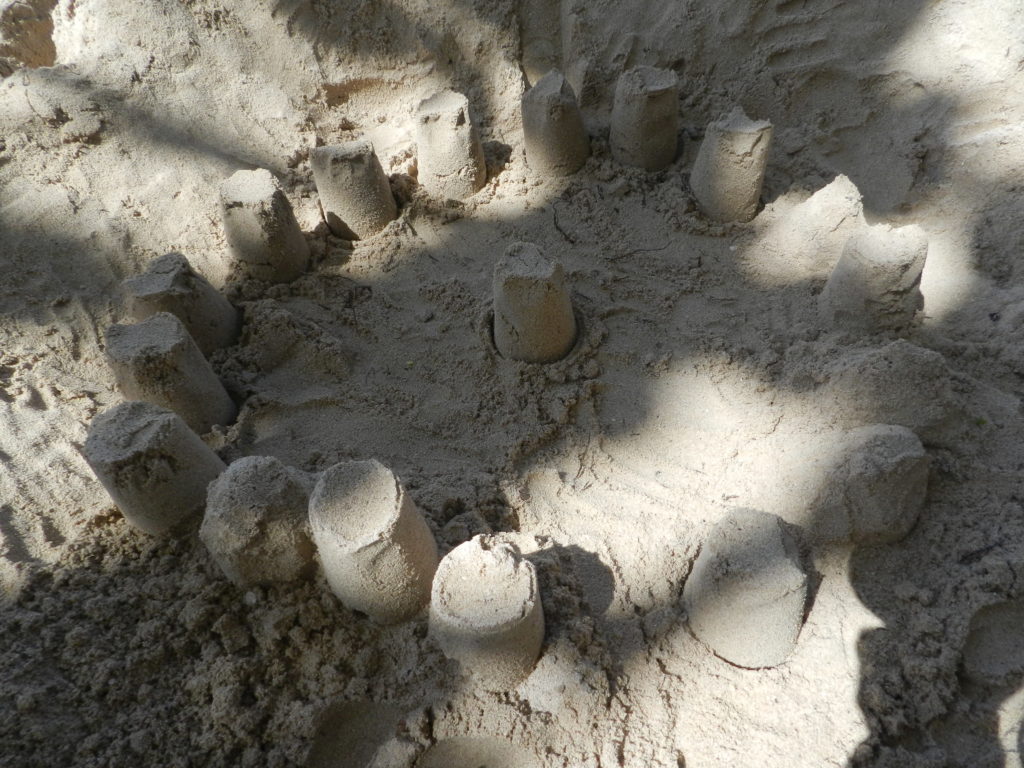 None of this makes perfect sense to me, but as I watched the sun rise on the ship days later, still overwhelmed and tearful about the unmet needs, I realized God is in control, God has a design in mind, a bigger plan. And I want to be part of it. This? This solidified in me the desire to return to Haiti, to do God’s work. I have unfinished business there. I did notice. And I will always remember.
None of this makes perfect sense to me, but as I watched the sun rise on the ship days later, still overwhelmed and tearful about the unmet needs, I realized God is in control, God has a design in mind, a bigger plan. And I want to be part of it. This? This solidified in me the desire to return to Haiti, to do God’s work. I have unfinished business there. I did notice. And I will always remember.
Some day I hope to meet all of these sisters and brothers in heaven. I’ll tell them I wanted to do more that day. We’ll dance. All will be well. And all the injustices of this world will be wiped clear, free, forevermore.
To the critics online that say the vendors in Labadee “virtually attack,” are “aggressive,” “hovering,” and “pushy?” I wish they could experience even an inkling of truth about the people of Haiti so they’d realize that “aggressive” means I desperately need something. “Hovering” means I need you to notice. “Pushy” means I really, really need this one thing for my son, my daughter, my mother, my brother. Please. “Virtually attack” means I just need you to see me, remember me, help me.
As for my children…they were transformed after that second visit to the market. We never brought them back to the ship for childrens’ activities. They stayed with us all day and were delightful, never again complaining. Maybe it’s service that heals selfishness? After the market visit, my daughter said “Mommy, Haiti’s a nice place.” Then later, she had another realization “Mom, after this we turned good. It feels good when you’re nice to others.” And hours later, “This is going to be a big remembery for us, isn’t it?” Yes it is. Yes it is.
Our family took the path less traveled back to the ship. A little platform overlooked the ocean. The ship, man-made beauty. The ocean, God’s beauty. A small boat filled with Haitian market vendors and employees on their way back to the village placed it all in perfect perspective. My husband noted, the boat was named “Thank God.”
 For I was hungry and you gave me something to eat, I was thirsty and you gave me something to drink, I was a stranger and you invited me in, I needed clothes and you clothed me, I was sick and you looked after me, I was in prison and you came to visit me. “Then the righteous will answer him, ‘Lord, when did we see you hungry and feed you, or thirsty and give you something to drink? When did we see you a stranger and invite you in, or needing clothes and clothe you? When did we see you sick or in prison and go to visit you?’ “The King will reply, ‘Truly I tell you, whatever you did for one of the least of these brothers and sisters of mine, you did for me.’ Matthew 25:35-40
For I was hungry and you gave me something to eat, I was thirsty and you gave me something to drink, I was a stranger and you invited me in, I needed clothes and you clothed me, I was sick and you looked after me, I was in prison and you came to visit me. “Then the righteous will answer him, ‘Lord, when did we see you hungry and feed you, or thirsty and give you something to drink? When did we see you a stranger and invite you in, or needing clothes and clothe you? When did we see you sick or in prison and go to visit you?’ “The King will reply, ‘Truly I tell you, whatever you did for one of the least of these brothers and sisters of mine, you did for me.’ Matthew 25:35-40
Amy
*This is part of a month-long series about my journey to Haiti. Click here to read all the posts in the series.
edited post from archives

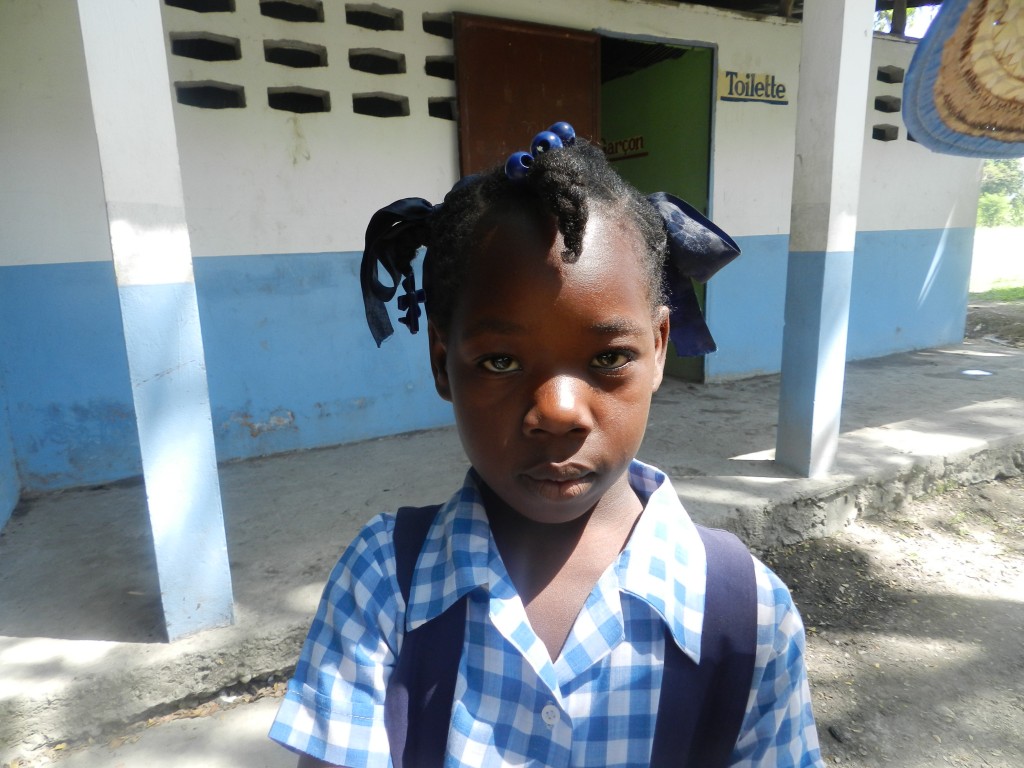
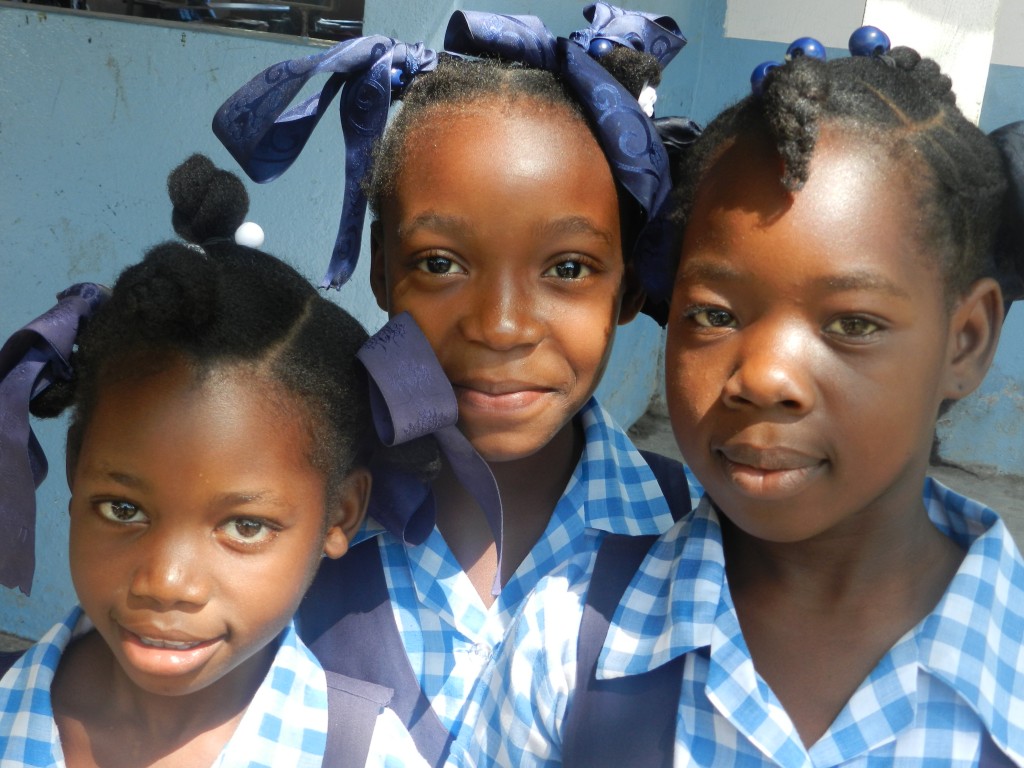
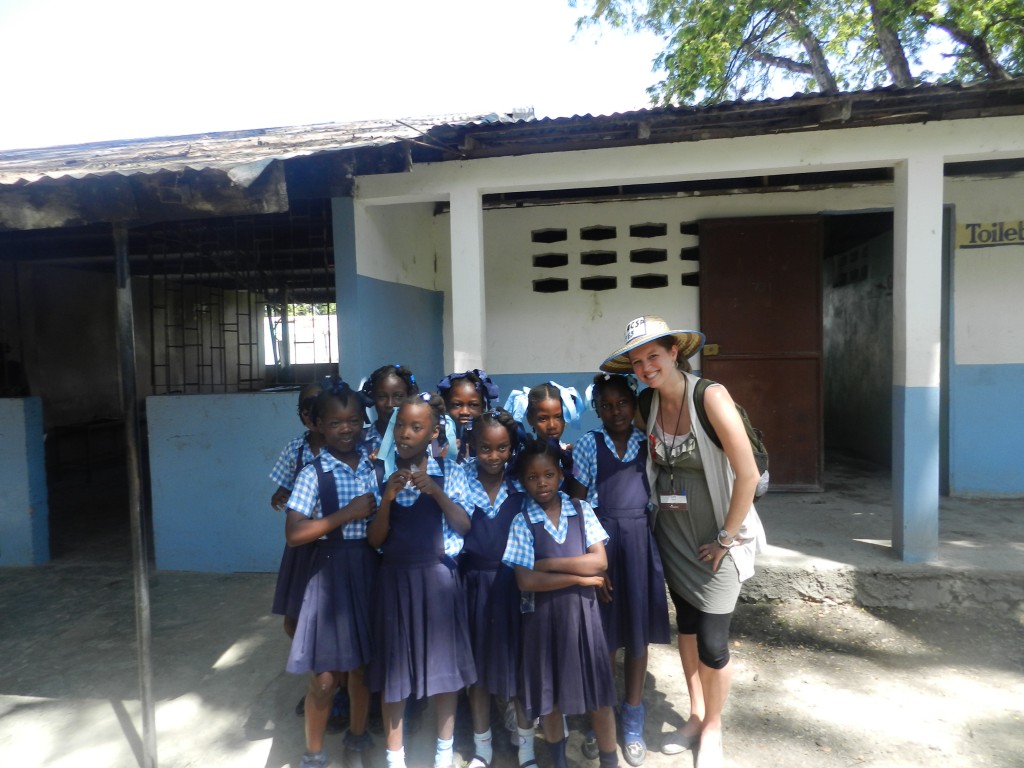
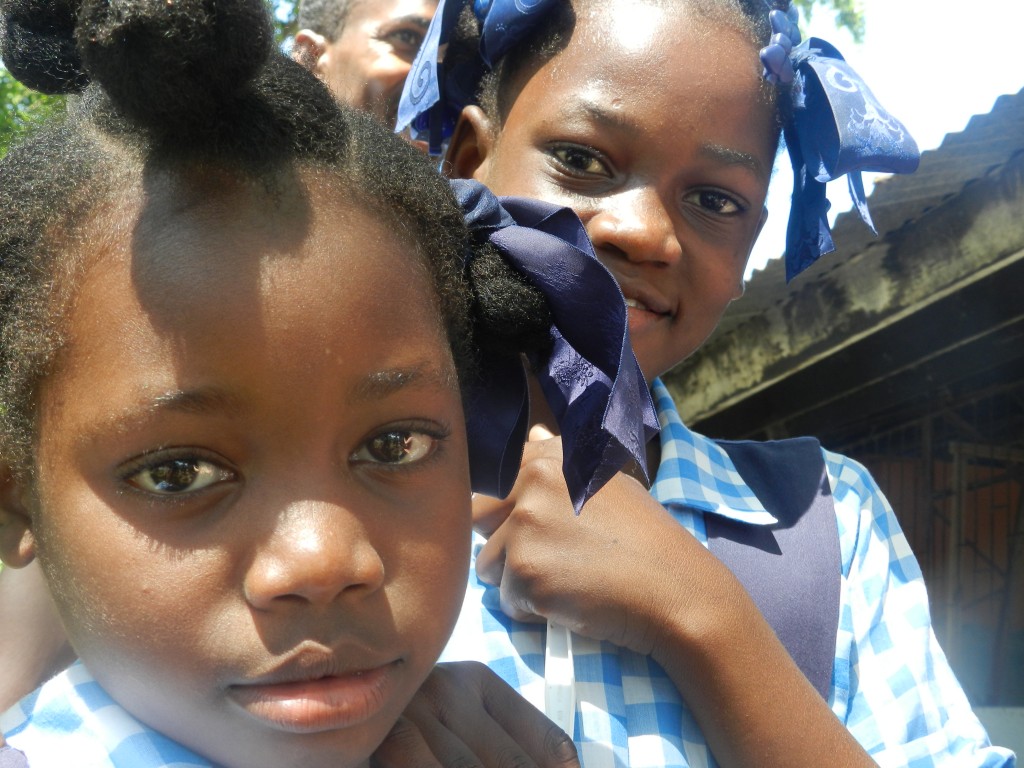
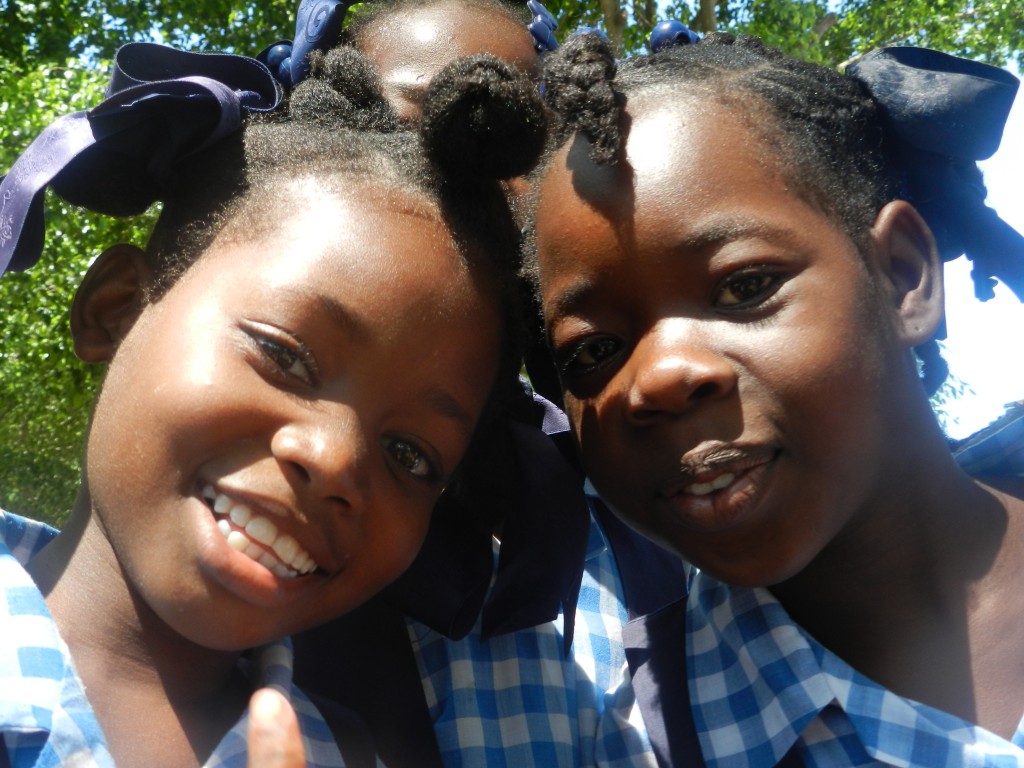
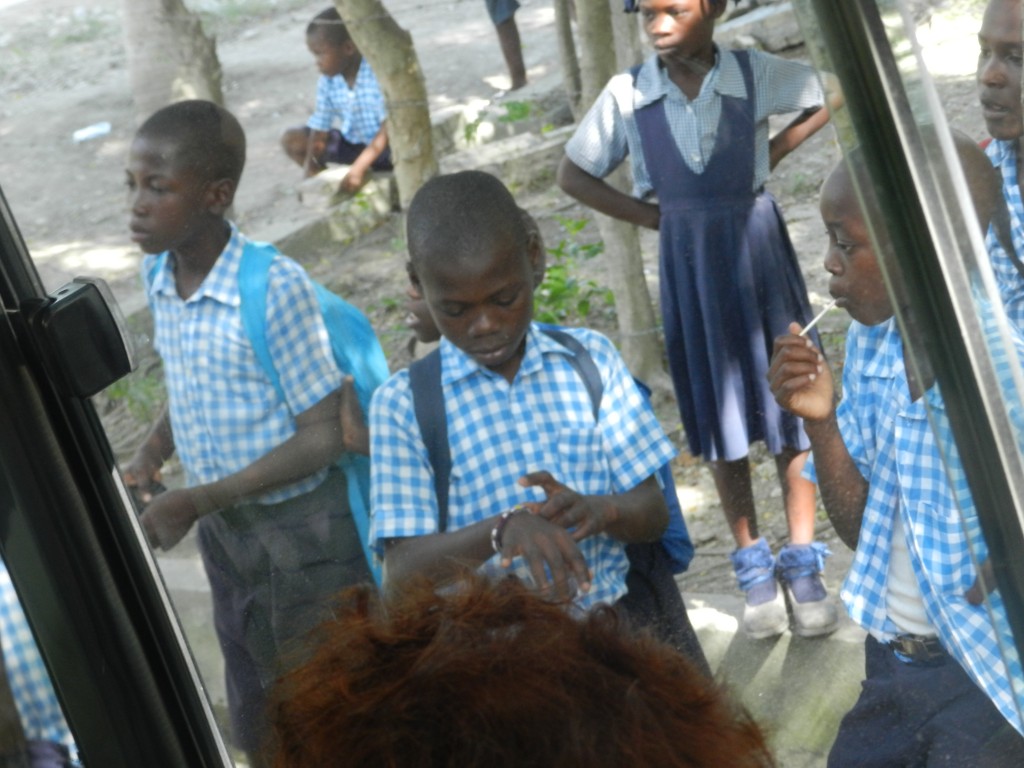
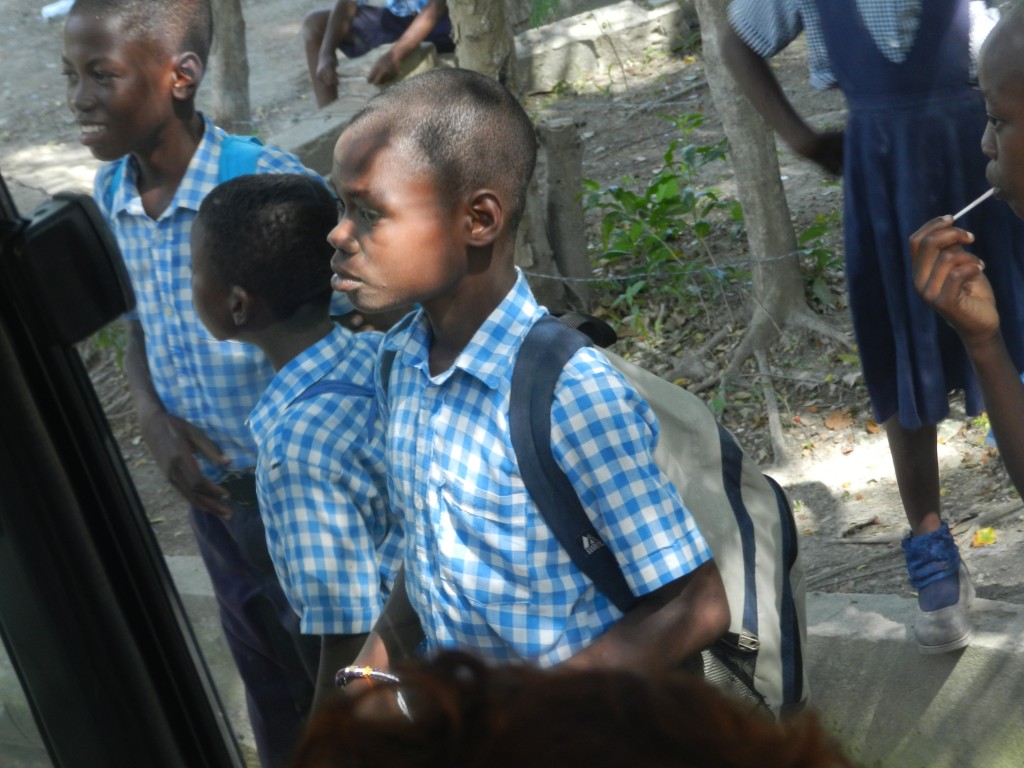
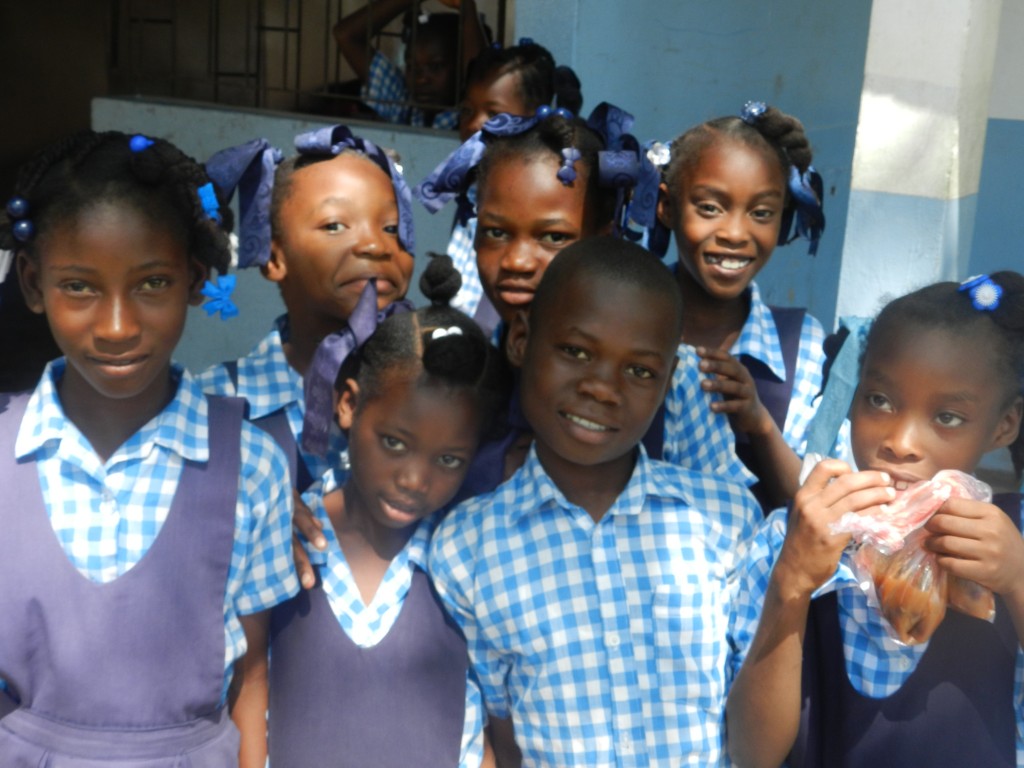
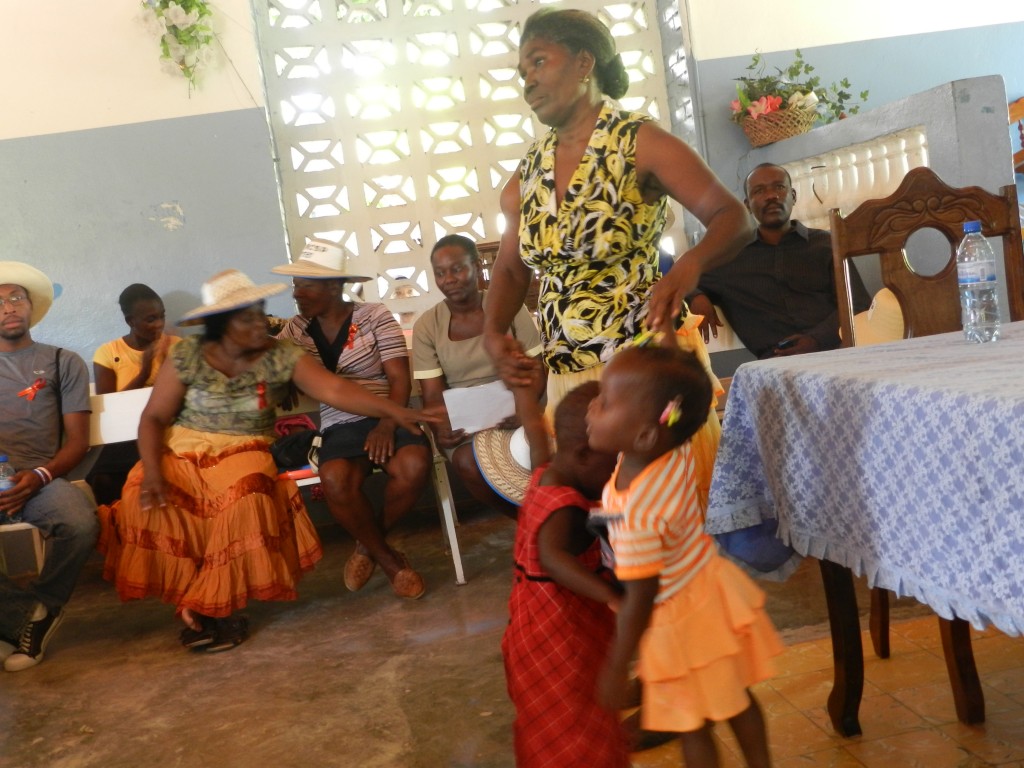
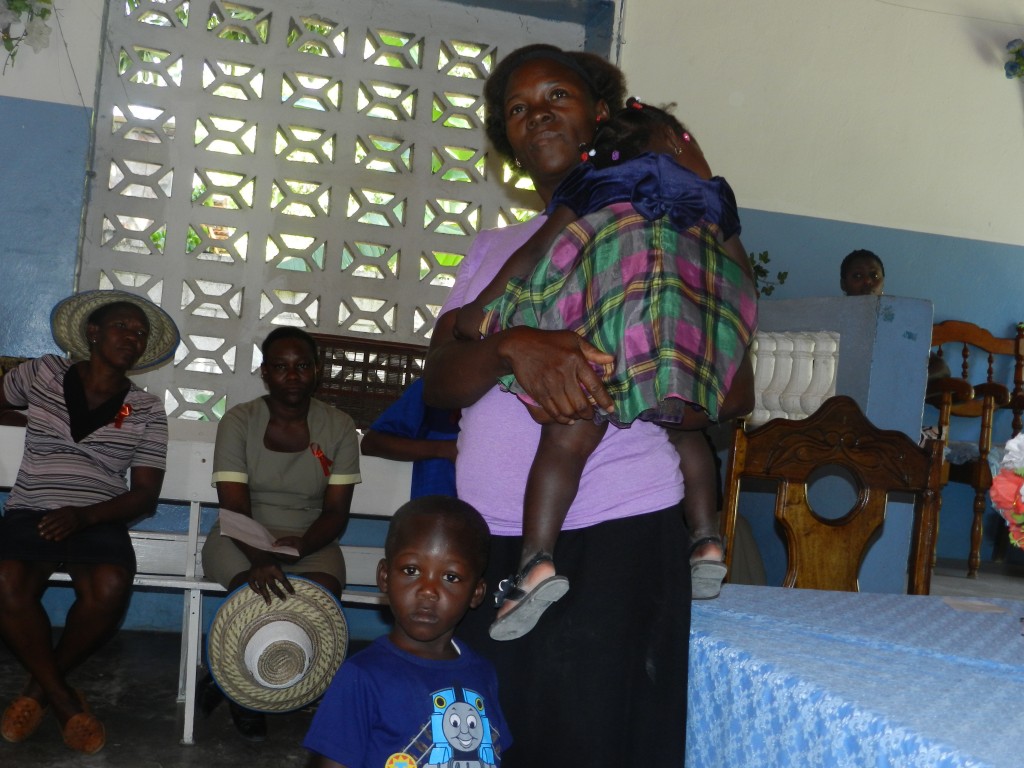
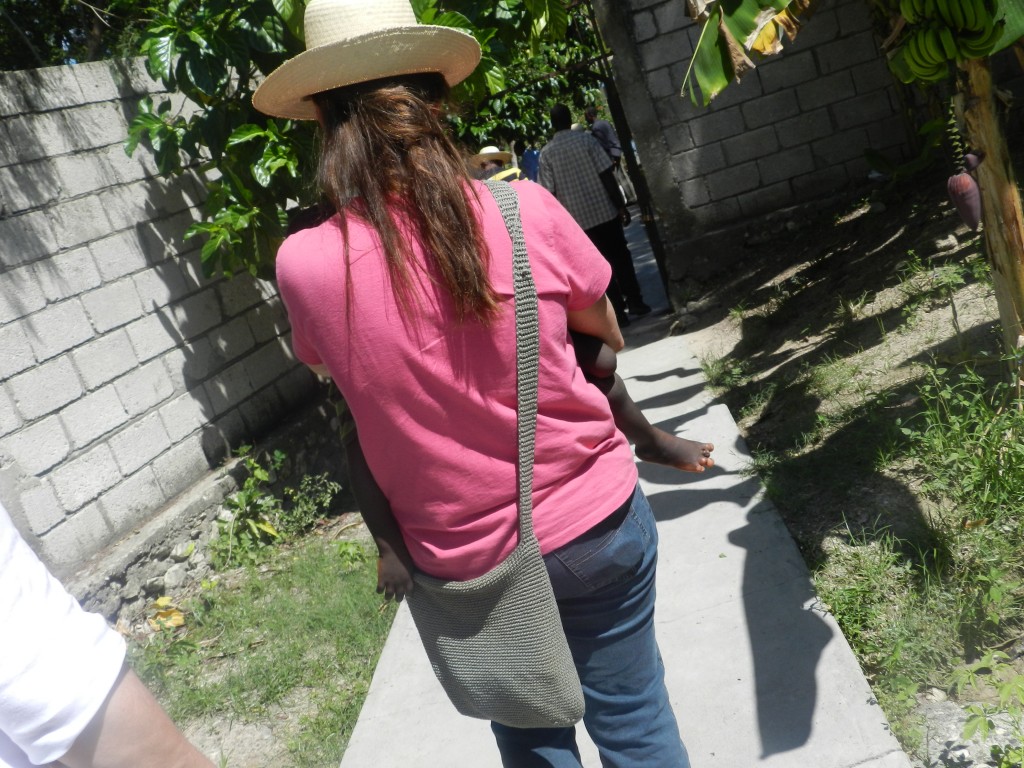
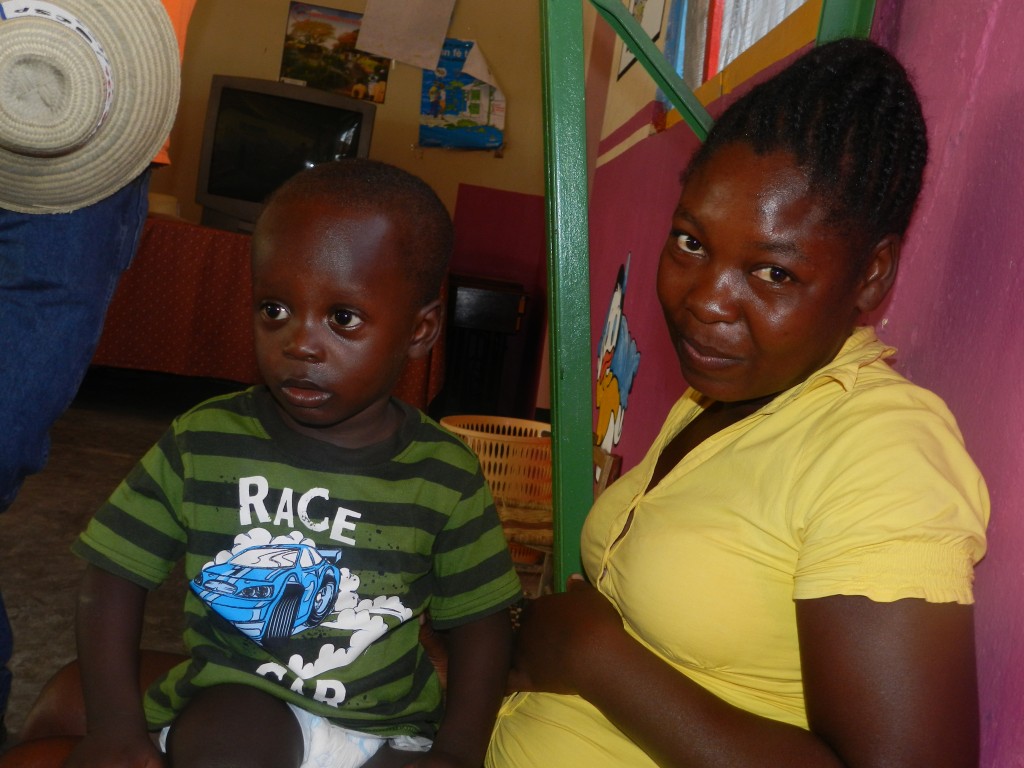
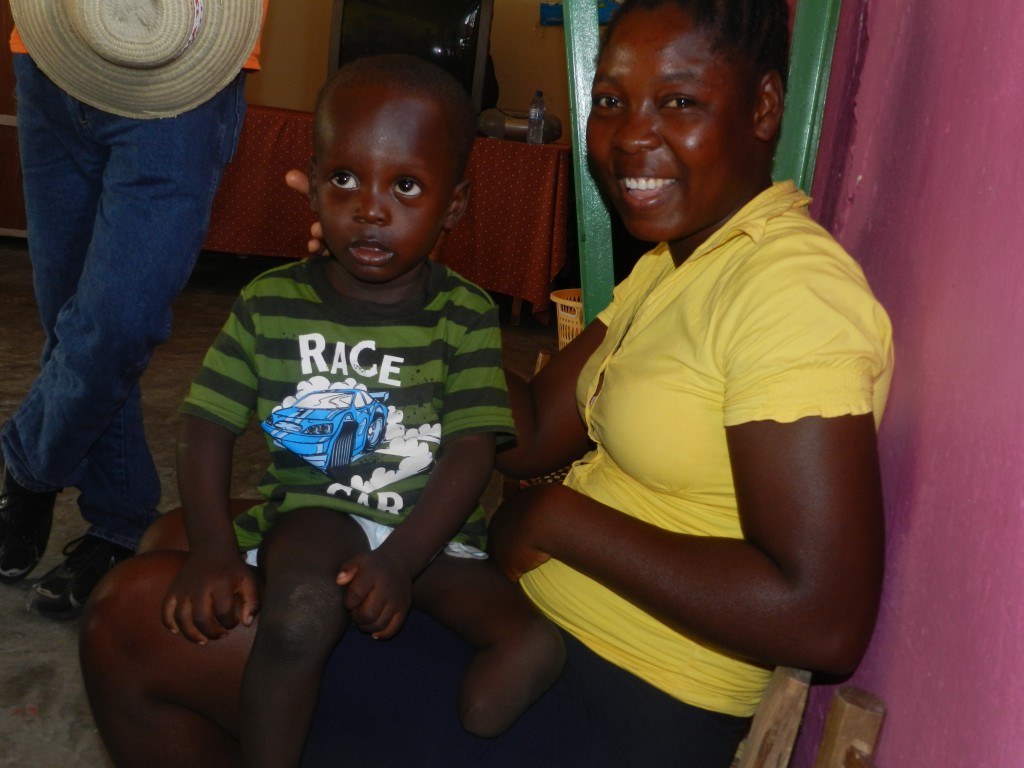
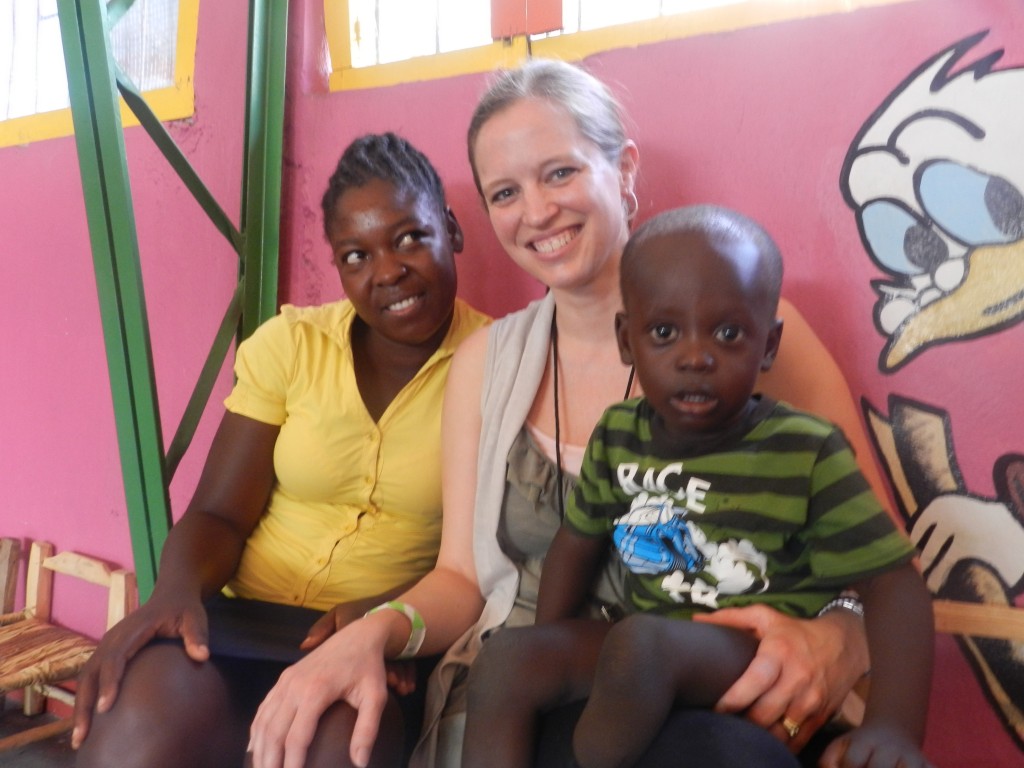



 Our family was cruising on one of
Our family was cruising on one of  My husband and I decided this was not working, so we planned to bring the kids back to the ship so they could partake in the day’s childrens’ activities. First, though, we were going back to the market. I thought the market trip might be rewarding bad behavior, but quickly learned it was just what the kids needed.
My husband and I decided this was not working, so we planned to bring the kids back to the ship so they could partake in the day’s childrens’ activities. First, though, we were going back to the market. I thought the market trip might be rewarding bad behavior, but quickly learned it was just what the kids needed. This time, we went up on the right, past the colorful display of canvas. When we came to the first row of vendors, Max came out to greet, introduced himself, invited us in, “No obligation,” he said. “Come see. We are family.” We barely got in, plaques were on the right at eye level carved with God Bless This Family and Jesus is My Boss. “You like these? Which one do you want?,” said Max. Sure, we’ll get one of these, I thought. Why not? Although I hadn’t a second to look at anything else. We bought the plaque and met the woman with Max, who I assumed was his mother and whose name I couldn’t understand. But she was warm and inviting, so after buying a small square pot, I gave her a hug.
This time, we went up on the right, past the colorful display of canvas. When we came to the first row of vendors, Max came out to greet, introduced himself, invited us in, “No obligation,” he said. “Come see. We are family.” We barely got in, plaques were on the right at eye level carved with God Bless This Family and Jesus is My Boss. “You like these? Which one do you want?,” said Max. Sure, we’ll get one of these, I thought. Why not? Although I hadn’t a second to look at anything else. We bought the plaque and met the woman with Max, who I assumed was his mother and whose name I couldn’t understand. But she was warm and inviting, so after buying a small square pot, I gave her a hug. Next there was Margaret. She showed us dolls she sewed herself, oddly similar to ones we noted at Downtown Disney two days prior, only these black and red and white and so much more authentic, ALL
Next there was Margaret. She showed us dolls she sewed herself, oddly similar to ones we noted at Downtown Disney two days prior, only these black and red and white and so much more authentic, ALL  It took me a while to realize that a man had taken our bag with plaque, doll, and pot, and was guiding us to his booth down the row. He offered to carve our name on the plaque we’d purchased at Max’s booth. He carved PEDERSON on the back and showed us his wares, asking if we wanted anything else. The kids, likely completely overwhelmed, had not a want for anything. “Sword?” said Derby. Already got one when we first arrived. “Bracelet?” Max had given us one. “Nothing? You don’t want anything?” Derby said. My heart broke. All I could keep thinking was my kids want for nothing, and it’s possible this man might need for everything. To want for nothing, to need for everything, both unimaginable in that moment. I found myself embarrassed for my children, our culture of excess, of everything all around. The look on his face when the kids wanted nothing was seared on my heart forever. My kids wanting nothing might mean him not eating today, tomorrow. He wasn’t just sad, he was disappointed, a devastated kind of disappointment. I could see it in his eyes. A reason for payment came to my mind – I paid him for carving our name on the plaque, thanked him generously, and left. Many others were calling for us. Looking back, I realize this moment was in a complete frenzy, another state. I was barely processing what was happening. We should’ve stayed longer at Derby’s place. The look in his eyes haunts me to this day. And you can see in my daughter’s face, she felt his need too.
It took me a while to realize that a man had taken our bag with plaque, doll, and pot, and was guiding us to his booth down the row. He offered to carve our name on the plaque we’d purchased at Max’s booth. He carved PEDERSON on the back and showed us his wares, asking if we wanted anything else. The kids, likely completely overwhelmed, had not a want for anything. “Sword?” said Derby. Already got one when we first arrived. “Bracelet?” Max had given us one. “Nothing? You don’t want anything?” Derby said. My heart broke. All I could keep thinking was my kids want for nothing, and it’s possible this man might need for everything. To want for nothing, to need for everything, both unimaginable in that moment. I found myself embarrassed for my children, our culture of excess, of everything all around. The look on his face when the kids wanted nothing was seared on my heart forever. My kids wanting nothing might mean him not eating today, tomorrow. He wasn’t just sad, he was disappointed, a devastated kind of disappointment. I could see it in his eyes. A reason for payment came to my mind – I paid him for carving our name on the plaque, thanked him generously, and left. Many others were calling for us. Looking back, I realize this moment was in a complete frenzy, another state. I was barely processing what was happening. We should’ve stayed longer at Derby’s place. The look in his eyes haunts me to this day. And you can see in my daughter’s face, she felt his need too. Jocelun led us to his place. He said in reference to my son, all wrapped up in his cruise ship towel, “He is my friend. I like him.” Jocelun touched my son gently on the shoulder. Before I knew it, Jocelun had a blue and white necklace on my son. Yes, we would buy. I asked for his name, I couldn’t understand so he wrote. He scratched JOCELUN on my tablet. He said again to my son “I like you. You are my friend.” Tears streamed, I was overwhelmed. Jocelun wanted me to take another look. I told him I’d promised a man down the row we’d come back to visit. Only $2 left, I wanted it to go to this man and keep my promise. Jocelun realized I was serious, so as he led me to the other man’s booth, he said “He’s a nice man.
Jocelun led us to his place. He said in reference to my son, all wrapped up in his cruise ship towel, “He is my friend. I like him.” Jocelun touched my son gently on the shoulder. Before I knew it, Jocelun had a blue and white necklace on my son. Yes, we would buy. I asked for his name, I couldn’t understand so he wrote. He scratched JOCELUN on my tablet. He said again to my son “I like you. You are my friend.” Tears streamed, I was overwhelmed. Jocelun wanted me to take another look. I told him I’d promised a man down the row we’d come back to visit. Only $2 left, I wanted it to go to this man and keep my promise. Jocelun realized I was serious, so as he led me to the other man’s booth, he said “He’s a nice man.  Wilfred was his name. Friendly man. Pots 2 for $5, he said. He accepted $2 for one when I told him that’s all we had left. I took his name and shook his hand. He smiled big and was clearly a warm and gentle heart.
Wilfred was his name. Friendly man. Pots 2 for $5, he said. He accepted $2 for one when I told him that’s all we had left. I took his name and shook his hand. He smiled big and was clearly a warm and gentle heart. Then the floodgates opened. A crowd of Haitian vendors were behind us, all around us. One had somehow gotten my daughter’s small pot and carved her name on it with hearts. “I want you to remember me too. You come back and you see me.” Josias was the name he wrote on my tablet. I snapped a photo.
Then the floodgates opened. A crowd of Haitian vendors were behind us, all around us. One had somehow gotten my daughter’s small pot and carved her name on it with hearts. “I want you to remember me too. You come back and you see me.” Josias was the name he wrote on my tablet. I snapped a photo. Another man approached, wanted to write his name on this tablet of mine. Leiys, I believe it was, barely intelligible. At this point, I realized I’d stumbled upon something. These people were not only willing to share their names, they were eager. It meant something to them, more than I could grasp. They saw me writing their names on the little tablet of paper I brought in my bag and they wanted a place on that space. To be recognized, to be known, to be called by name. Isn’t that what we all want?
Another man approached, wanted to write his name on this tablet of mine. Leiys, I believe it was, barely intelligible. At this point, I realized I’d stumbled upon something. These people were not only willing to share their names, they were eager. It meant something to them, more than I could grasp. They saw me writing their names on the little tablet of paper I brought in my bag and they wanted a place on that space. To be recognized, to be known, to be called by name. Isn’t that what we all want? Venturing back to the market by myself, I entered by Max. Max and Margaret and Almagor approached, others literally swarmed around. I explained I’d forgotten this bag of clothes and was bringing it for Derby, four booths down. A man spoke definitively “I have a baby ma’am.” I had brought two receiving blankets and gave them to him. Margaret and Almagor were hovering, nearly reaching in my bag. One of them said “I need something.” My hands could do nothing but take out each item and give to those who were asking. A dress for one woman, a dress for another, a shirt and skirt for Margaret, two bananas for a man. Margaret gladly took the bag, “I need this.” If I’d only known, I would’ve brought another bag full, or two or three.
Venturing back to the market by myself, I entered by Max. Max and Margaret and Almagor approached, others literally swarmed around. I explained I’d forgotten this bag of clothes and was bringing it for Derby, four booths down. A man spoke definitively “I have a baby ma’am.” I had brought two receiving blankets and gave them to him. Margaret and Almagor were hovering, nearly reaching in my bag. One of them said “I need something.” My hands could do nothing but take out each item and give to those who were asking. A dress for one woman, a dress for another, a shirt and skirt for Margaret, two bananas for a man. Margaret gladly took the bag, “I need this.” If I’d only known, I would’ve brought another bag full, or two or three. I returned to the beach. My husband and the kids were still gone. I looked up, looked around. There was still no time to sit. I walked the beach a bit. A mom was rushing on the shore, so mad at her kids. A man’s fat belly protruded as he sunbathed. A buffet was being set. Did they know the need just beyond the arches in the market, beyond the fence that bound us in and them out?
I returned to the beach. My husband and the kids were still gone. I looked up, looked around. There was still no time to sit. I walked the beach a bit. A mom was rushing on the shore, so mad at her kids. A man’s fat belly protruded as he sunbathed. A buffet was being set. Did they know the need just beyond the arches in the market, beyond the fence that bound us in and them out? As I thought and moved about, I was especially concerned about this man, Antonio, who needed clothes for his 2-year-old son. I knew I had none. I’d have to leave him empty handed, hopes dashed, or search and make a plea to some random mom. We were at the beach, a distance from the ship. A mom would have to give the clothes off of her son’s back or go all the way back to the ship to suitcases. This was my journey that day, not some other mom’s journey. Or was it? I was confused, torn. Search for a mom with a 2-year-old boy (there weren’t that many) and ask them to surrender part of their day vacationing with family to meet the needs of a man I had met at the market? I couldn’t bring myself to ask even one, but kept thinking of the moms at home and how they’d all give the shirts off their sons’ backs for this toddler in need. I kept thinking of the boxes of clothes I had sitting in our basement. I didn’t even ask one mom. Two worlds collided. The reality I saw on one side, the reality I saw on the other. Could the two connect today? Was I telling myself truth that people wouldn’t want to know or didn’t care or just wanted to enjoy the beach? I think, and believe now, that my beliefs and behaviors in regards to those 2-year-old clothes were flawed that day.
As I thought and moved about, I was especially concerned about this man, Antonio, who needed clothes for his 2-year-old son. I knew I had none. I’d have to leave him empty handed, hopes dashed, or search and make a plea to some random mom. We were at the beach, a distance from the ship. A mom would have to give the clothes off of her son’s back or go all the way back to the ship to suitcases. This was my journey that day, not some other mom’s journey. Or was it? I was confused, torn. Search for a mom with a 2-year-old boy (there weren’t that many) and ask them to surrender part of their day vacationing with family to meet the needs of a man I had met at the market? I couldn’t bring myself to ask even one, but kept thinking of the moms at home and how they’d all give the shirts off their sons’ backs for this toddler in need. I kept thinking of the boxes of clothes I had sitting in our basement. I didn’t even ask one mom. Two worlds collided. The reality I saw on one side, the reality I saw on the other. Could the two connect today? Was I telling myself truth that people wouldn’t want to know or didn’t care or just wanted to enjoy the beach? I think, and believe now, that my beliefs and behaviors in regards to those 2-year-old clothes were flawed that day. I gathered a pile of clothes for Alfred, a men’s outfit for Jackson, and a pile of fruit for Antonio, the very least we could do in lieu of clothes for his son. (I have notable regrets about not getting more from the ship. We should’ve come back all hands loaded, bags and bags overflowing. Again, some of this was mere lack of time to process everything that was happening.) Security noticed all the fruit at the bottom of the bag and made us drop it in a plastic bin before we deboarded. Almost in tears, knowing I would now return empty handed to Antonio, no clothes, no fruit, nothing, I obeyed. A woman standing by said “you never know if you’re doing the right thing, do you?” Little did she know. Even my daughter knew this was bad.
I gathered a pile of clothes for Alfred, a men’s outfit for Jackson, and a pile of fruit for Antonio, the very least we could do in lieu of clothes for his son. (I have notable regrets about not getting more from the ship. We should’ve come back all hands loaded, bags and bags overflowing. Again, some of this was mere lack of time to process everything that was happening.) Security noticed all the fruit at the bottom of the bag and made us drop it in a plastic bin before we deboarded. Almost in tears, knowing I would now return empty handed to Antonio, no clothes, no fruit, nothing, I obeyed. A woman standing by said “you never know if you’re doing the right thing, do you?” Little did she know. Even my daughter knew this was bad.

 None of this makes perfect sense to me, but as I watched the sun rise on the ship days later, still overwhelmed and tearful about the unmet needs, I realized God is in control, God has a design in mind, a bigger plan. And I want to be part of it. This? This solidified in me the desire to return to Haiti, to do God’s work. I have unfinished business there. I did notice. And I will always remember.
None of this makes perfect sense to me, but as I watched the sun rise on the ship days later, still overwhelmed and tearful about the unmet needs, I realized God is in control, God has a design in mind, a bigger plan. And I want to be part of it. This? This solidified in me the desire to return to Haiti, to do God’s work. I have unfinished business there. I did notice. And I will always remember. For I was hungry and you gave me something to eat, I was thirsty and you gave me something to drink, I was a stranger and you invited me in, I needed clothes and you clothed me, I was sick and you looked after me, I was in prison and you came to visit me. “Then the righteous will answer him, ‘Lord, when did we see you hungry and feed you, or thirsty and give you something to drink? When did we see you a stranger and invite you in, or needing clothes and clothe you? When did we see you sick or in prison and go to visit you?’ “The King will reply, ‘Truly I tell you, whatever you did for one of the least of these brothers and sisters of mine, you did for me.’ Matthew 25:35-40
For I was hungry and you gave me something to eat, I was thirsty and you gave me something to drink, I was a stranger and you invited me in, I needed clothes and you clothed me, I was sick and you looked after me, I was in prison and you came to visit me. “Then the righteous will answer him, ‘Lord, when did we see you hungry and feed you, or thirsty and give you something to drink? When did we see you a stranger and invite you in, or needing clothes and clothe you? When did we see you sick or in prison and go to visit you?’ “The King will reply, ‘Truly I tell you, whatever you did for one of the least of these brothers and sisters of mine, you did for me.’ Matthew 25:35-40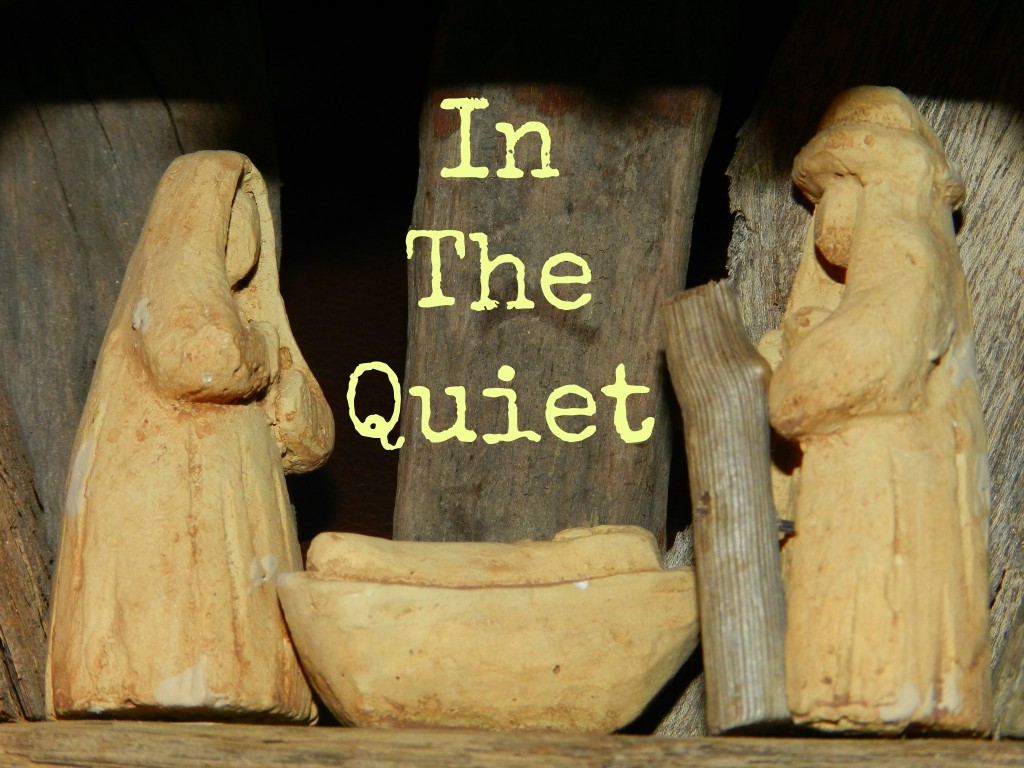
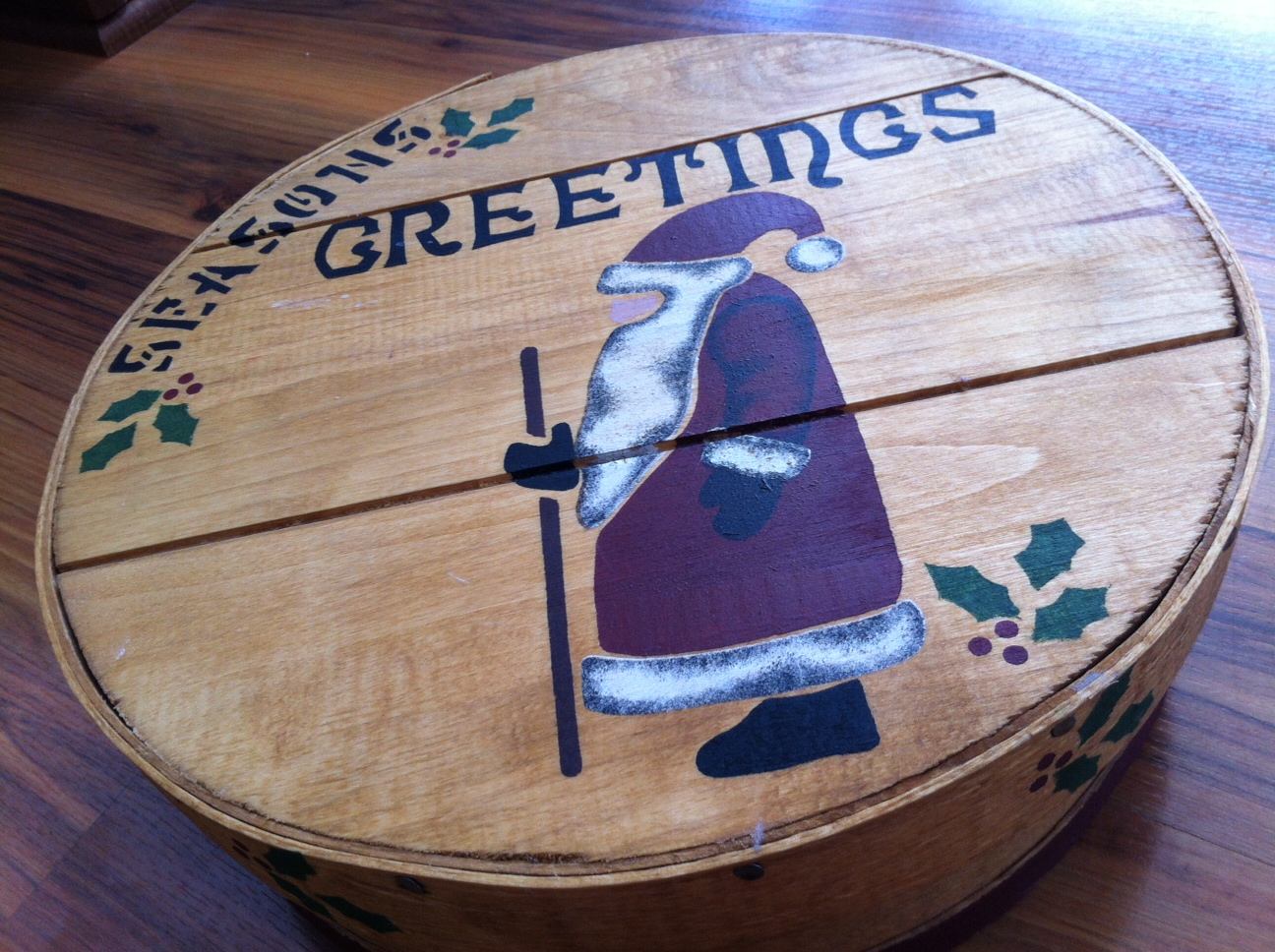
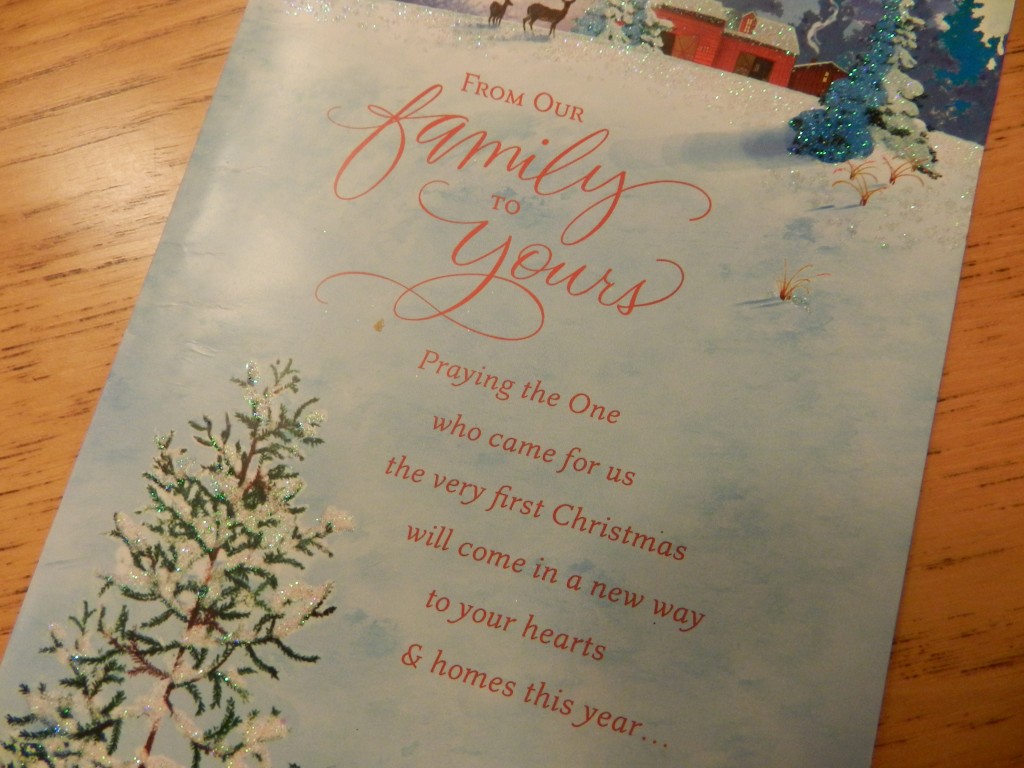
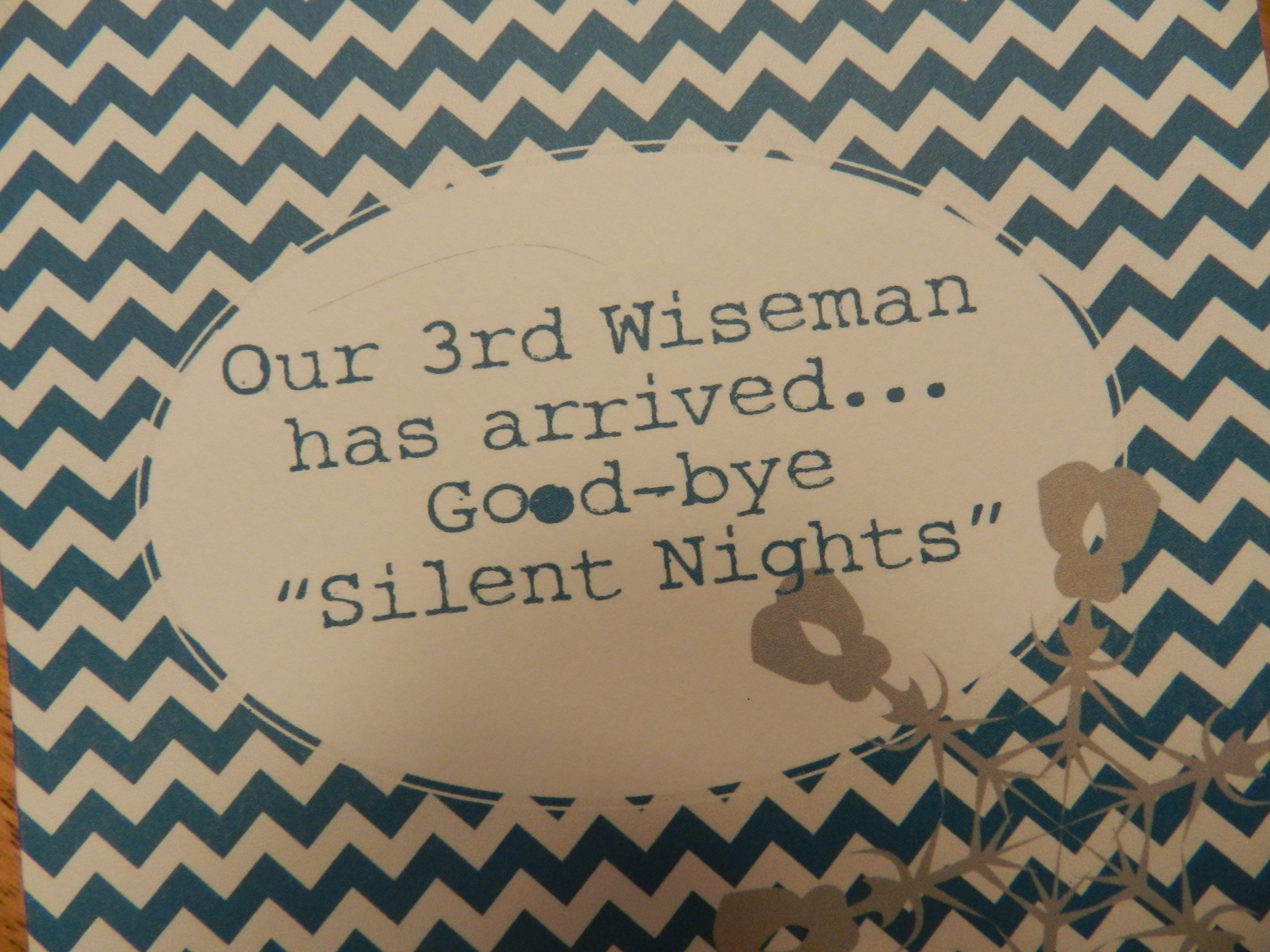
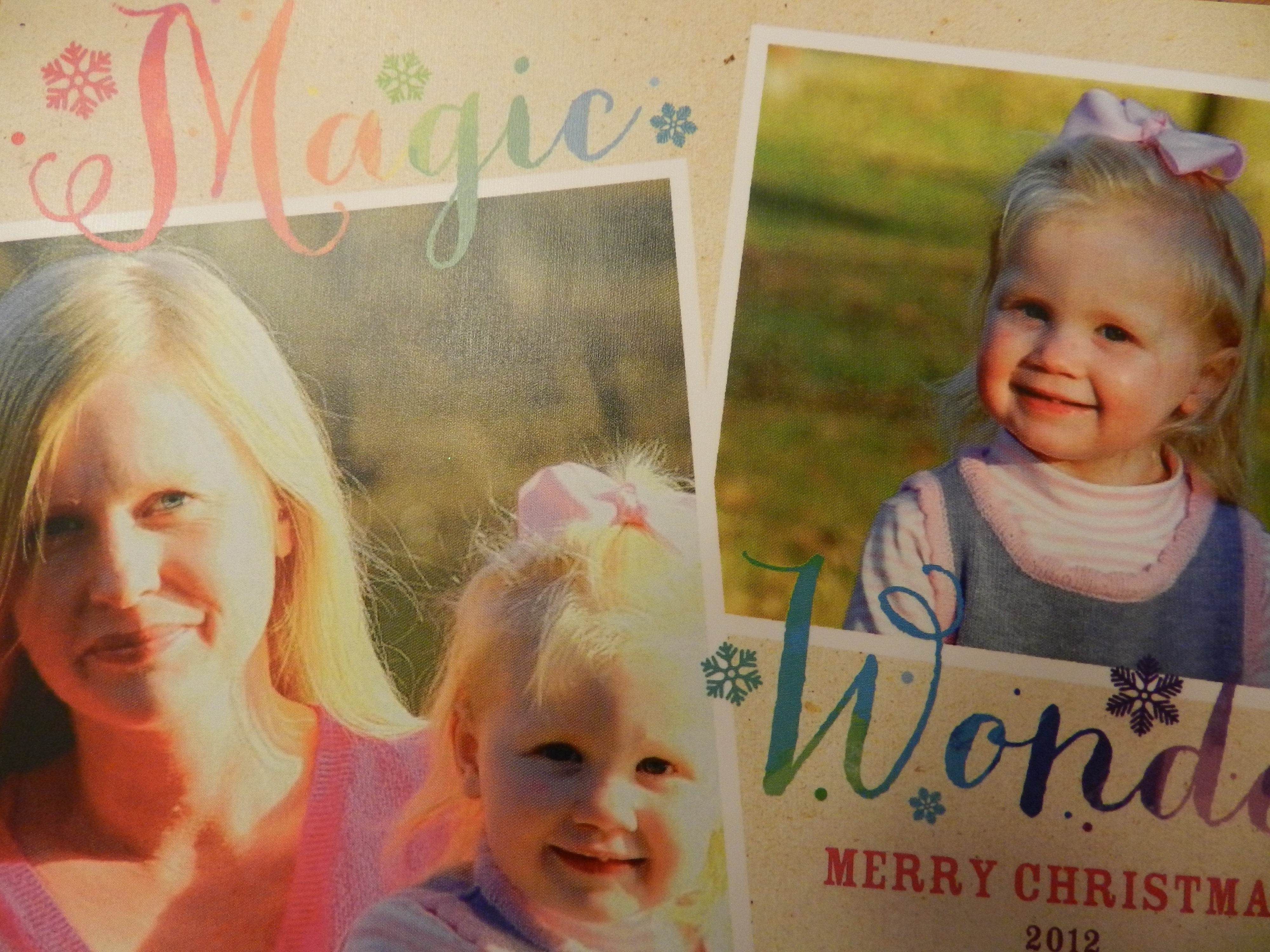
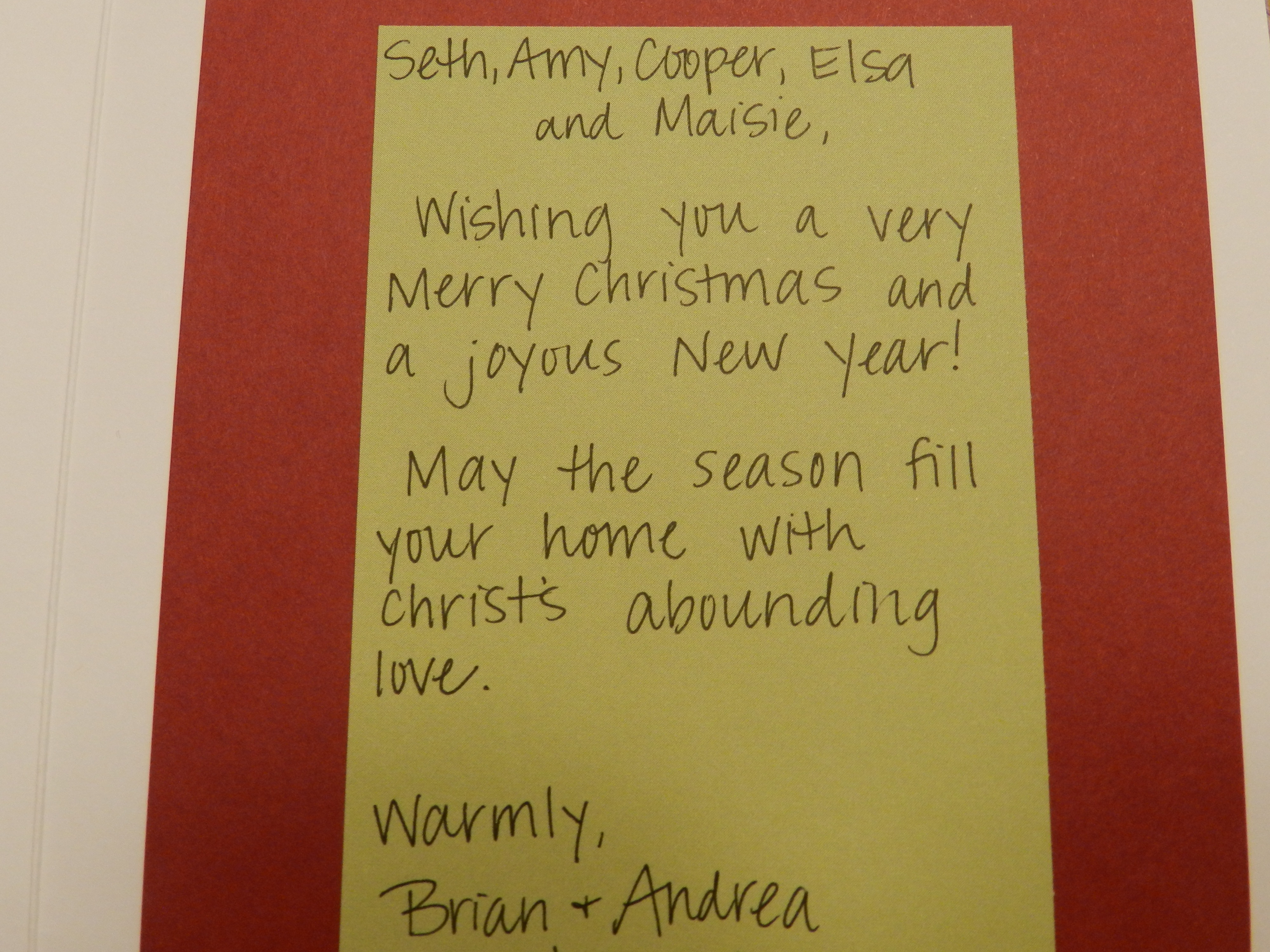
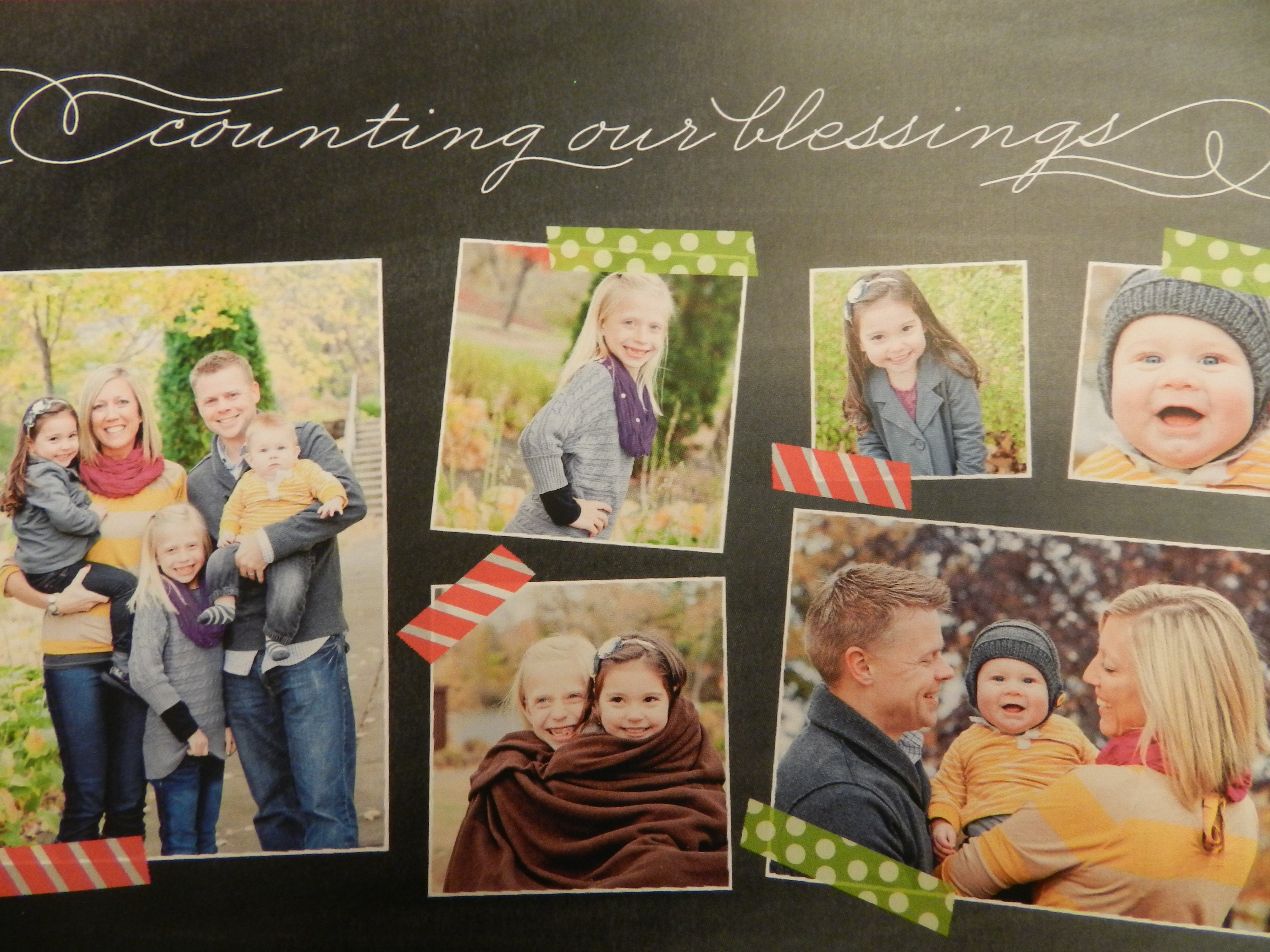
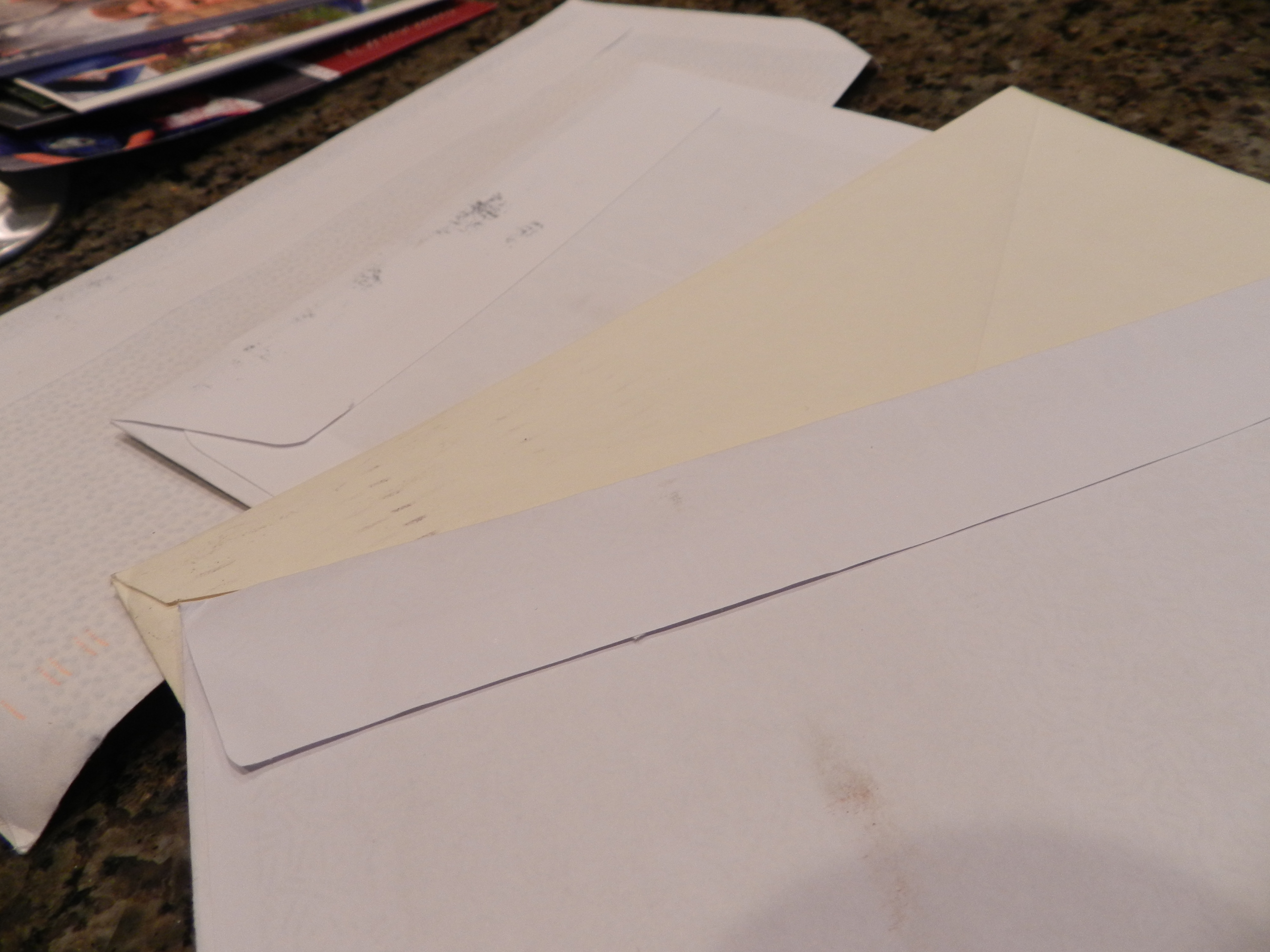
I’m tearing up over here at how tenderly you value life. Our lives are surrounded by relationship-whether it be a clerk at a gas station, a employee at a drive-thru window or a card received at Christmas I am gloriously amazed at how each face that is seen by you is infinitely valued….your heart is not only seen by me, but by our Lord. Please offer yourself some grace in your journey to love like Jesus-I think you love others beautifully!
Thanks for including us, once again, in this blog. Means so much! I showed Raegan the picture, and she smiled. Asking how that pink bow got in her hair. : ) We’re probably not going to have a Christmas card this year, but we’ll hopefully get something put together, once the baby arrives?